
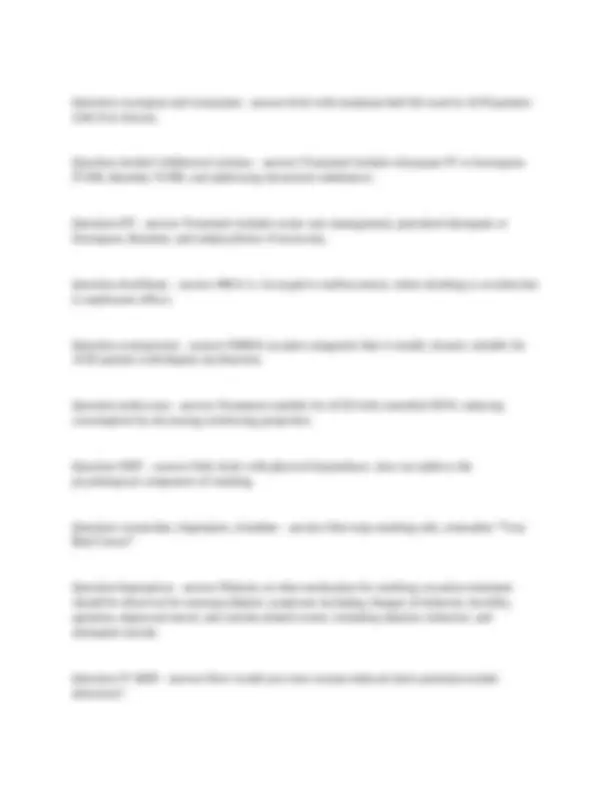
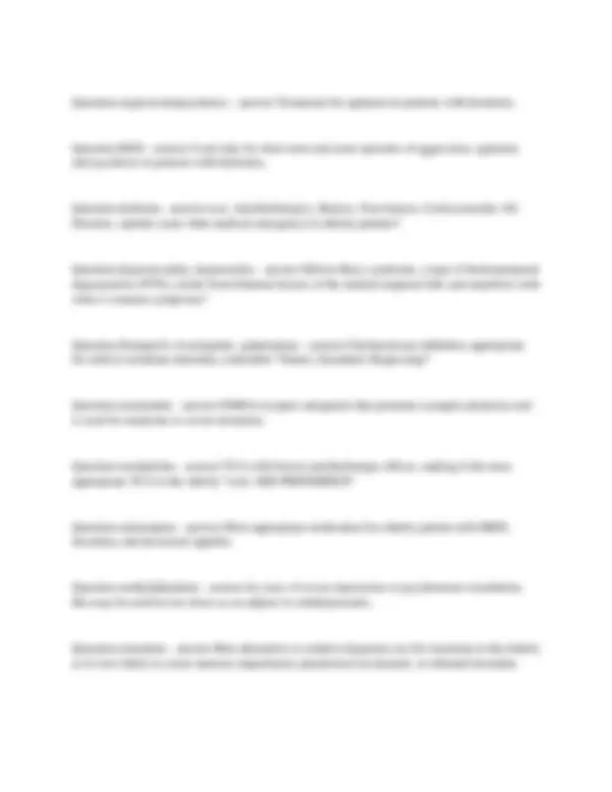
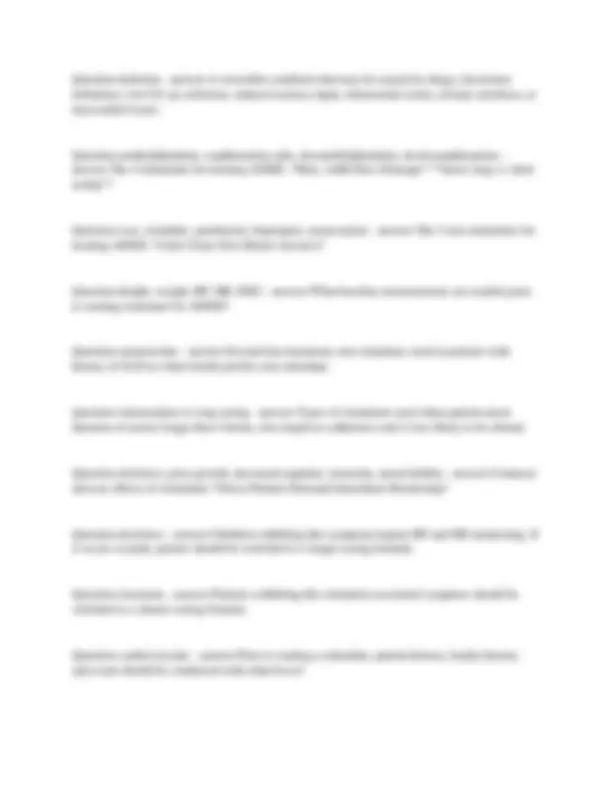
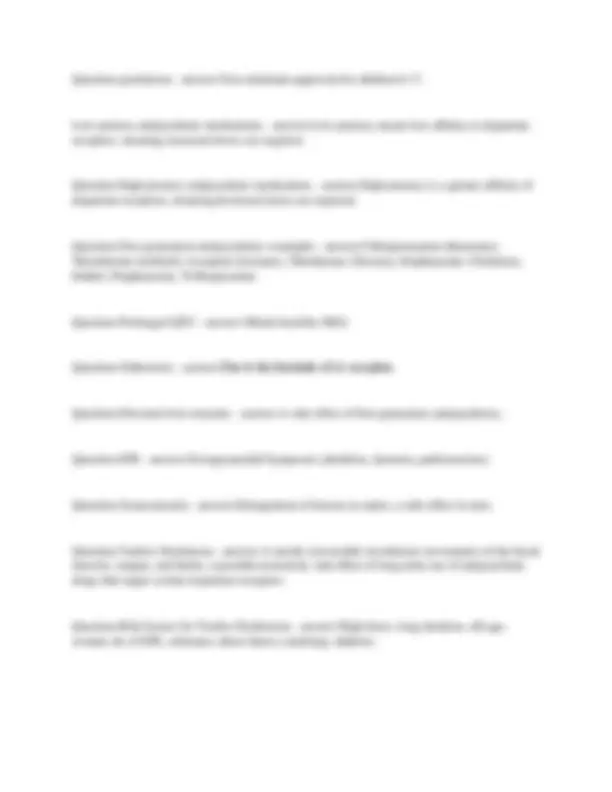
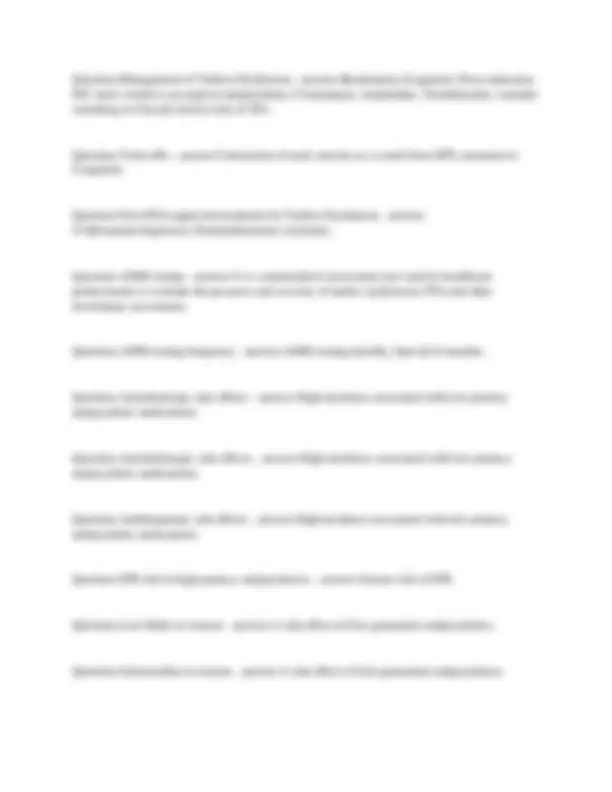
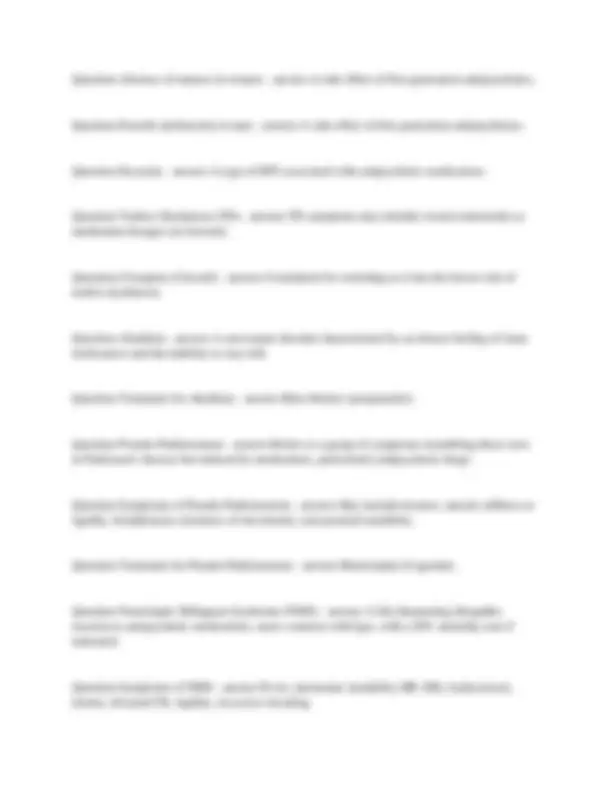
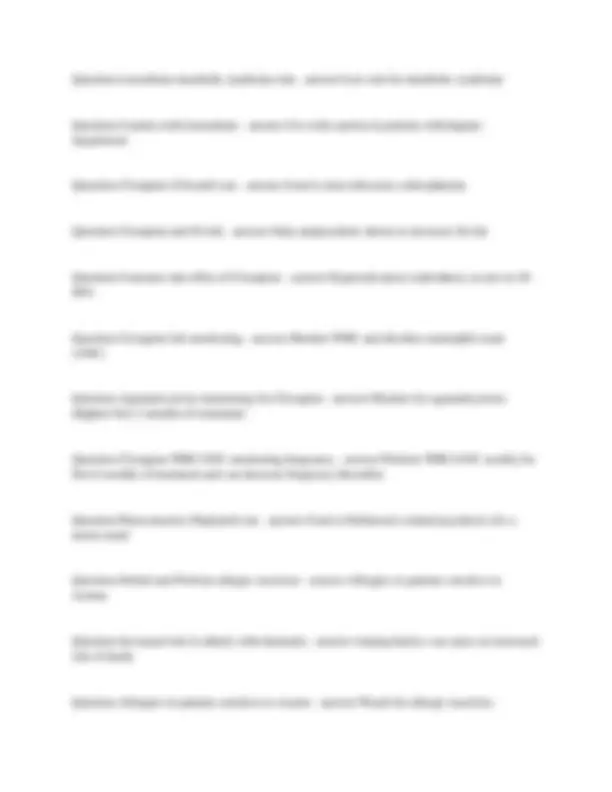
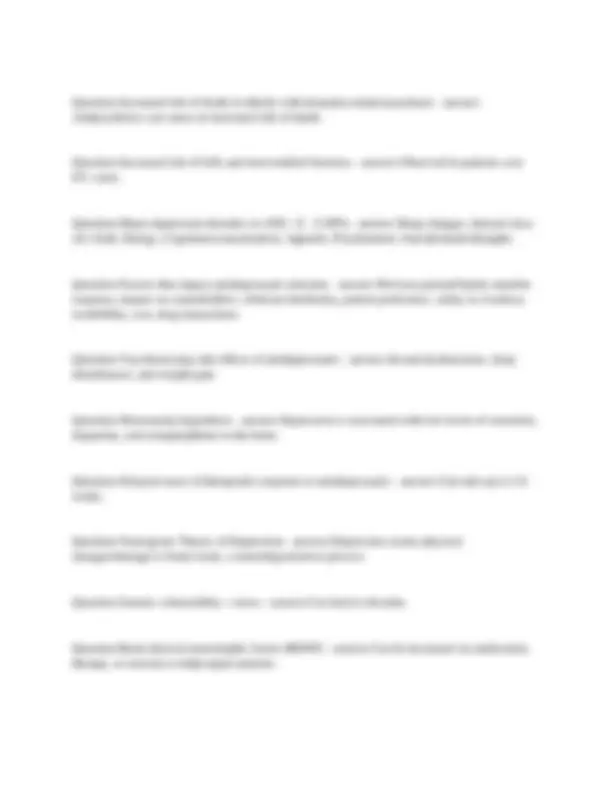
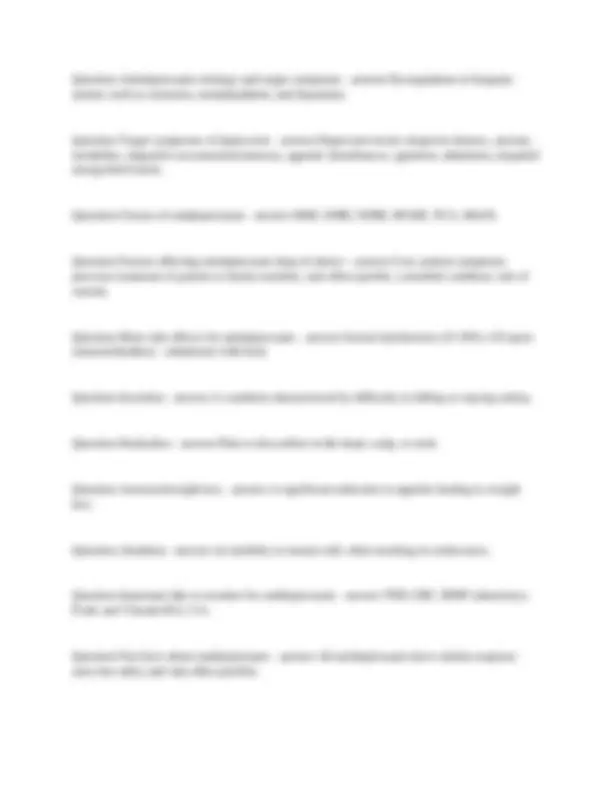
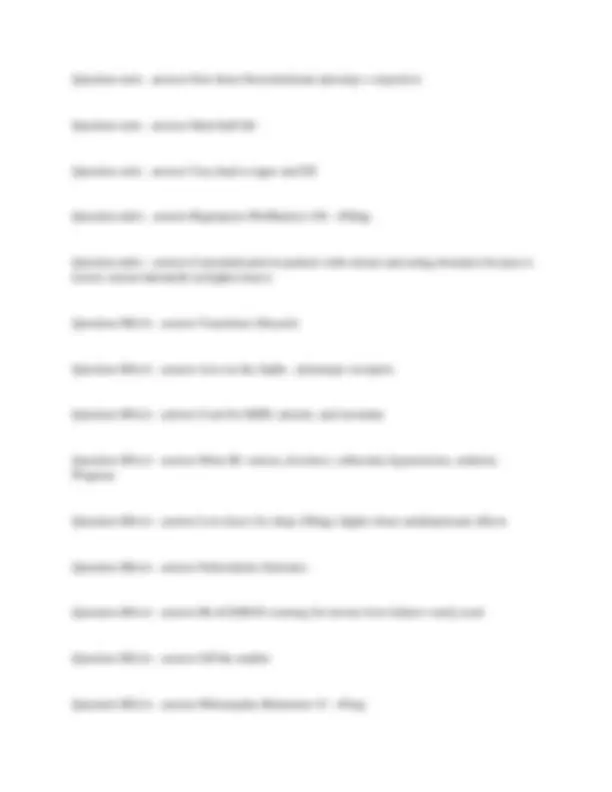
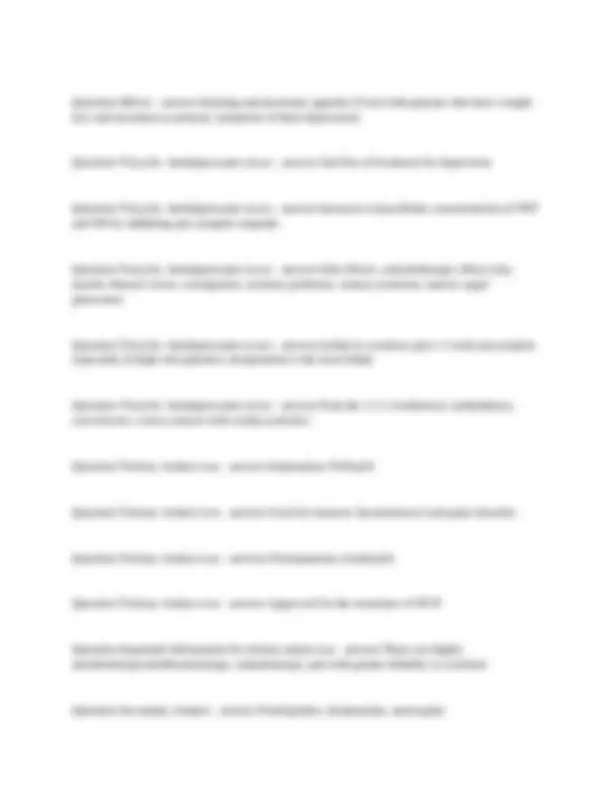
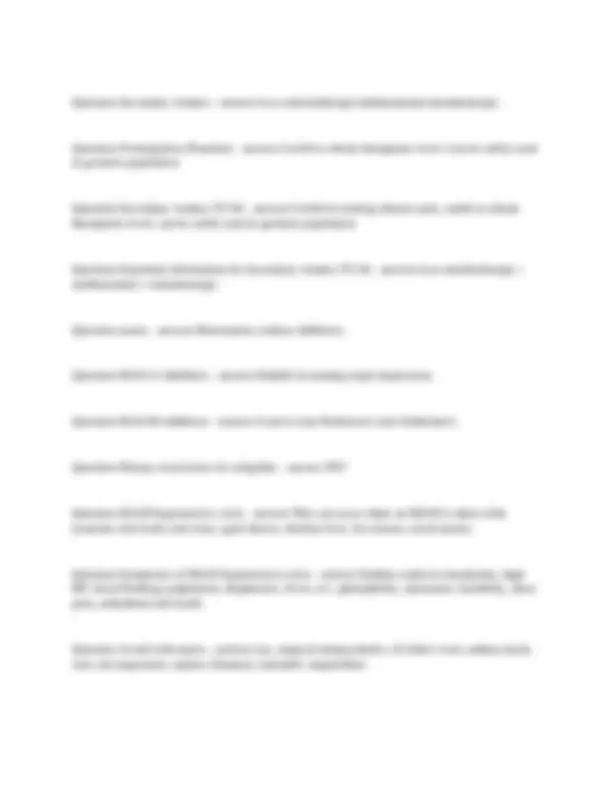
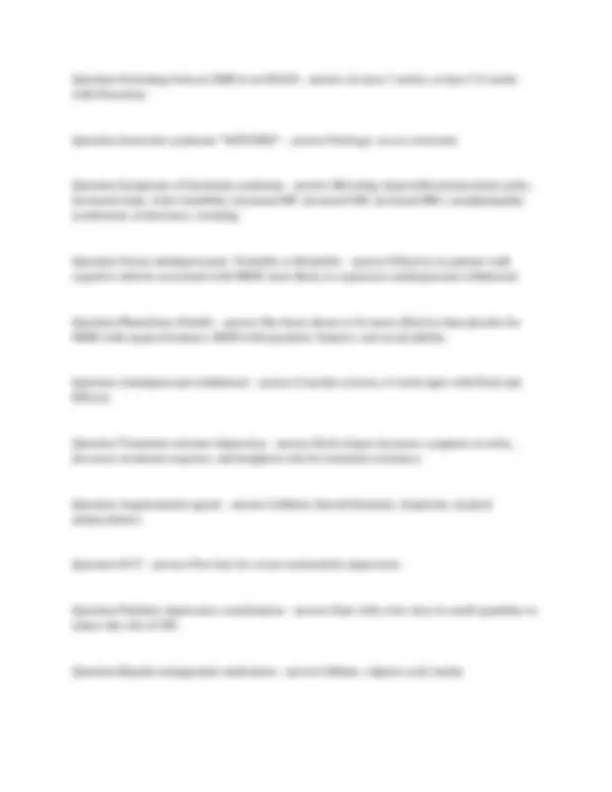
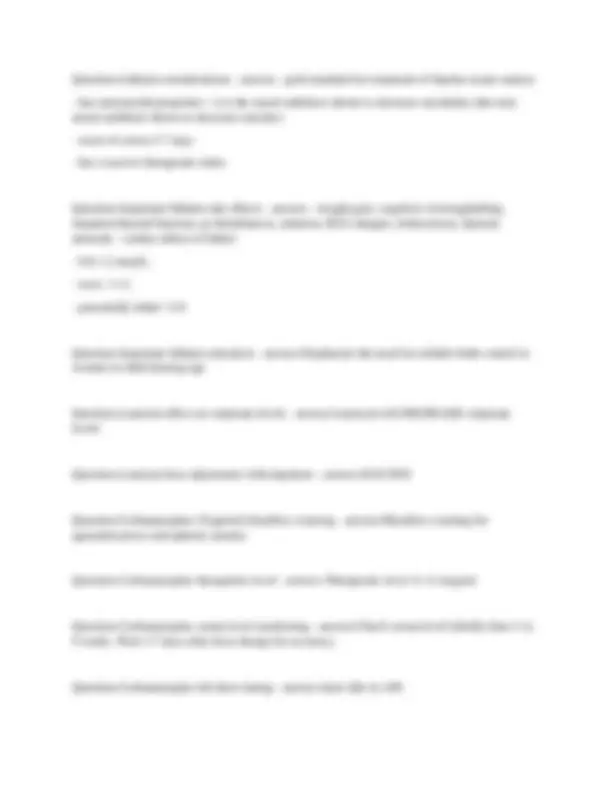
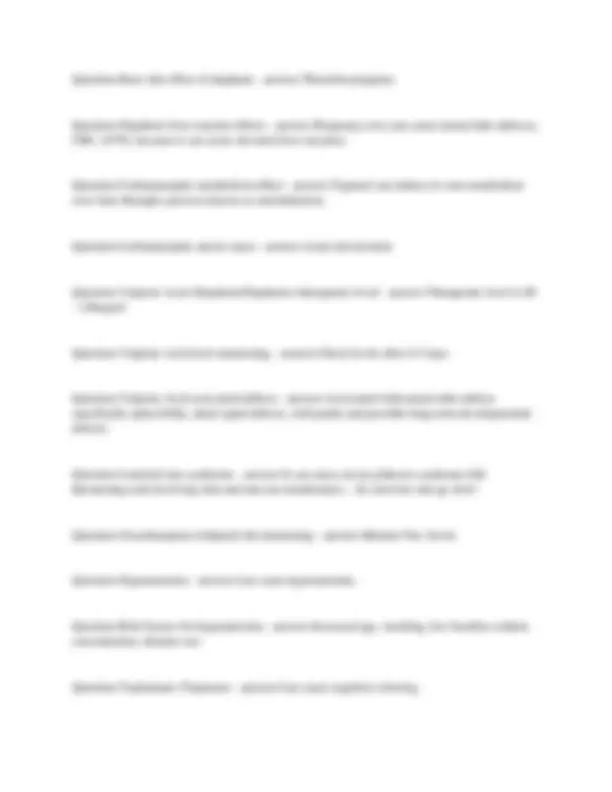
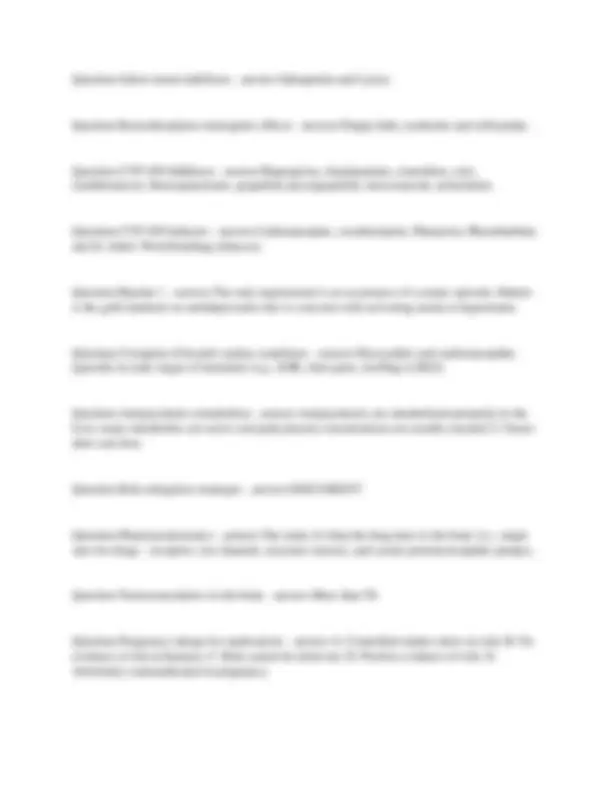
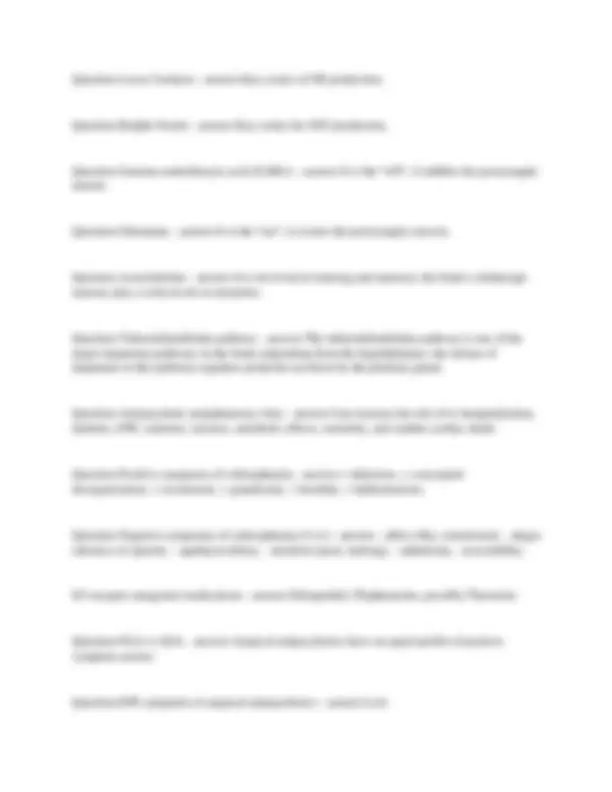
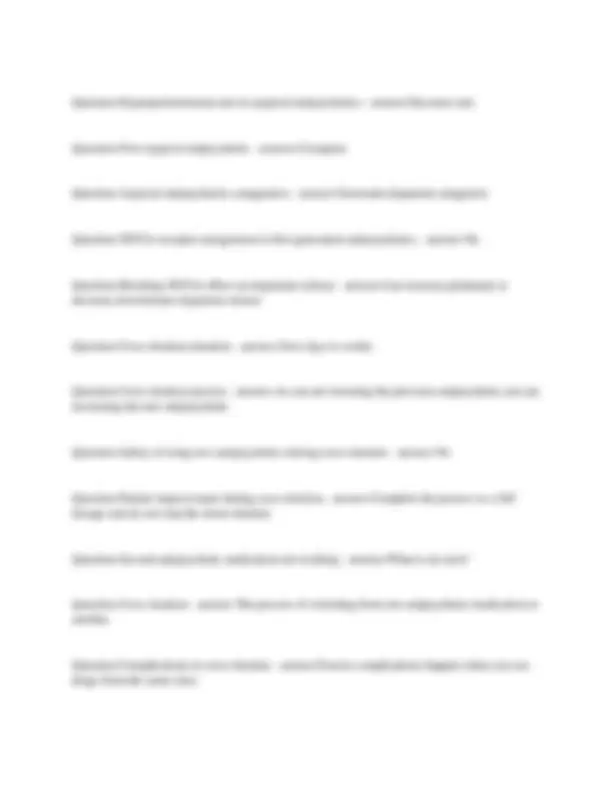
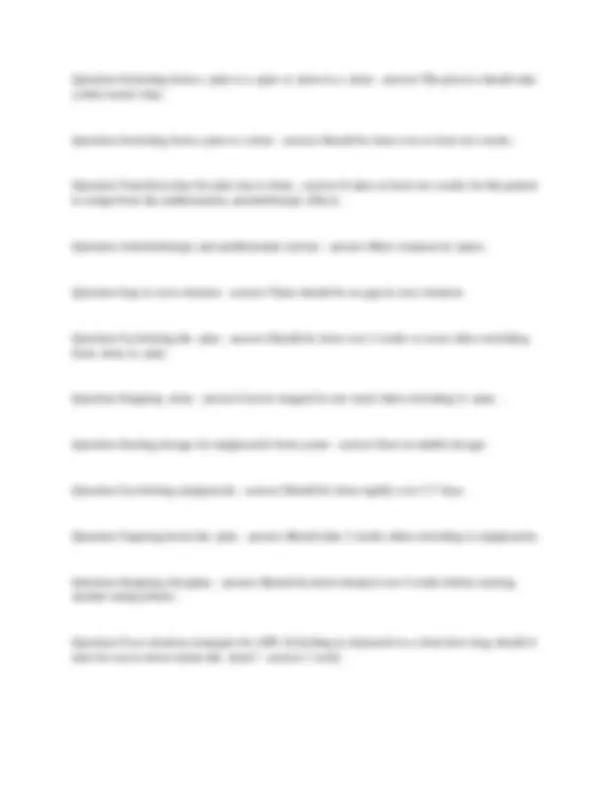
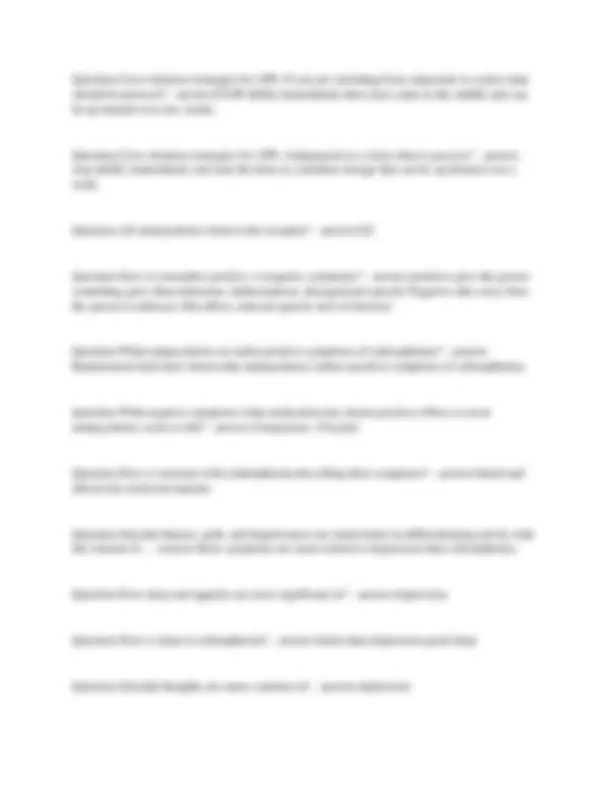
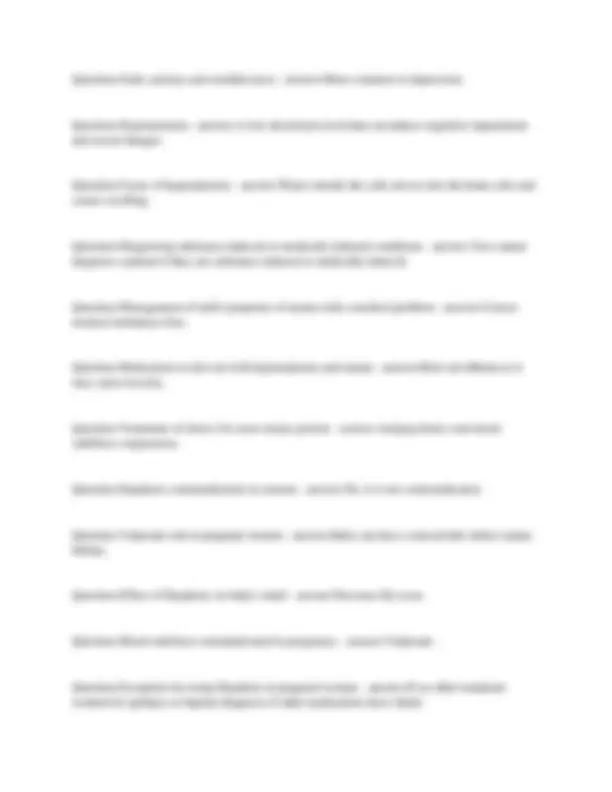
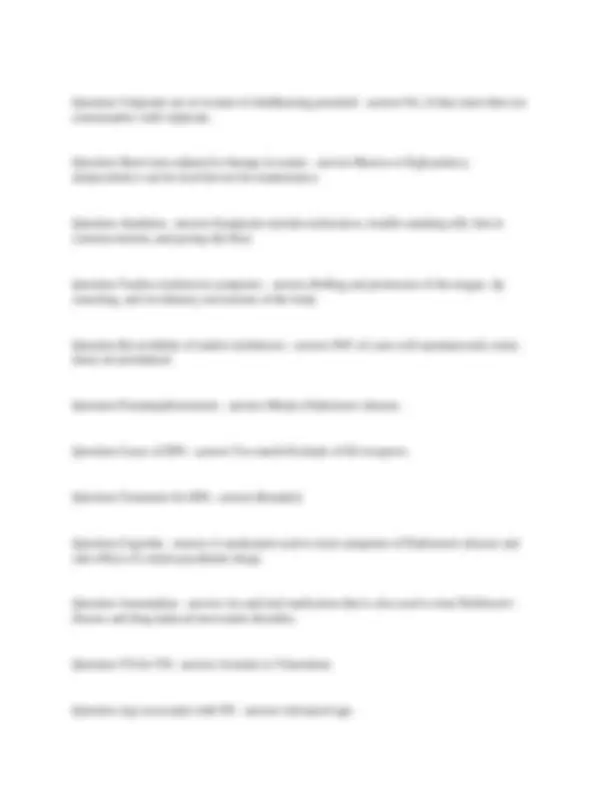
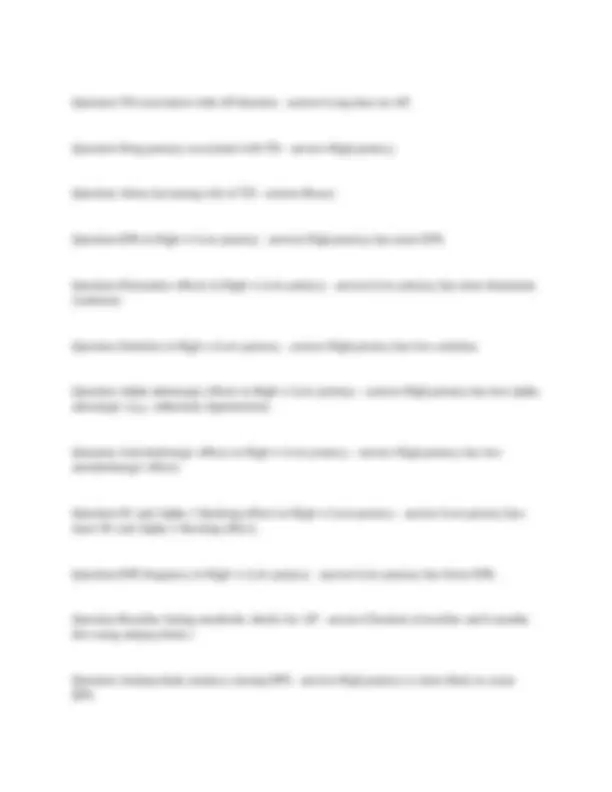
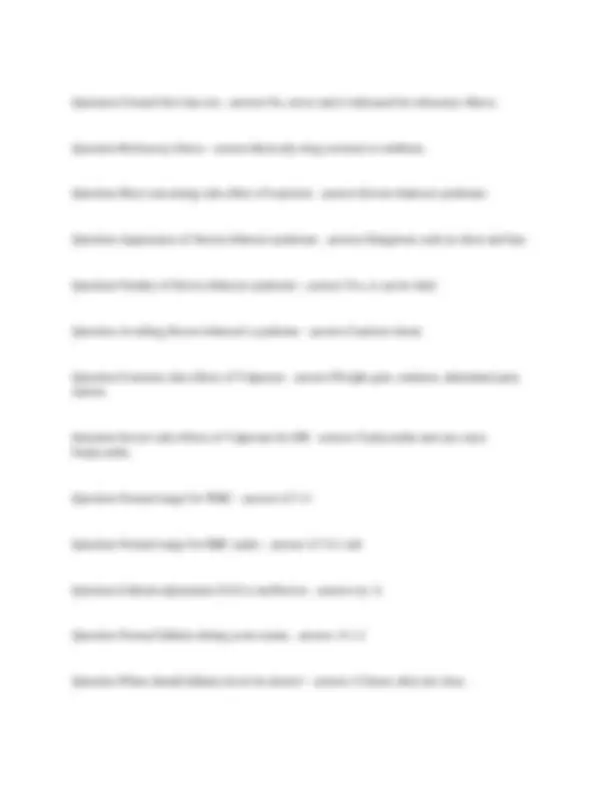
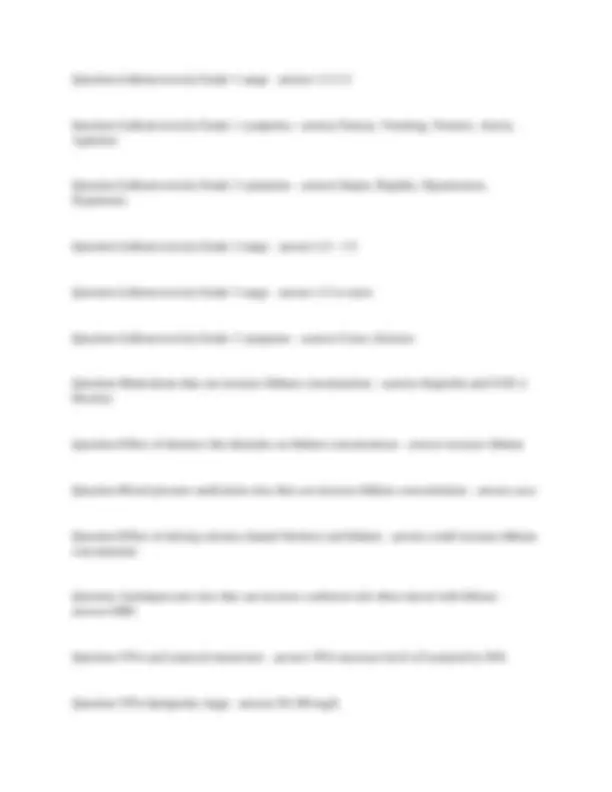
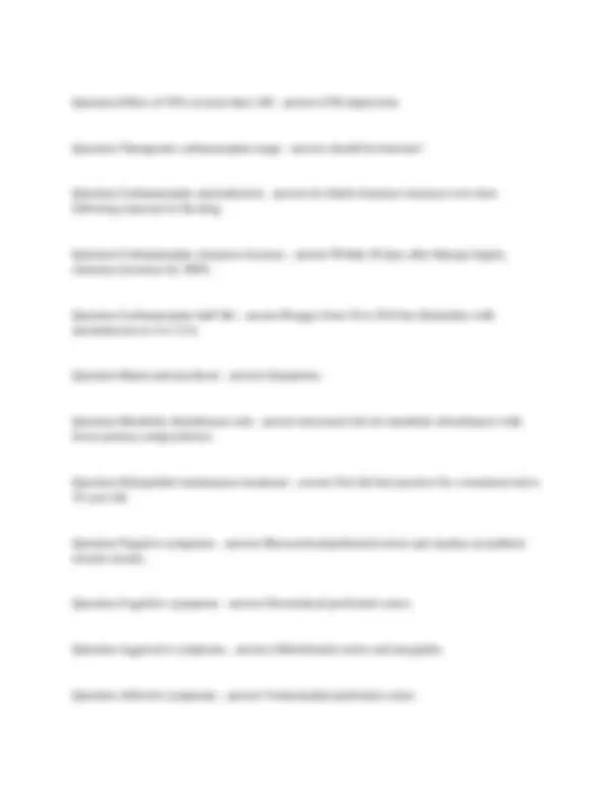
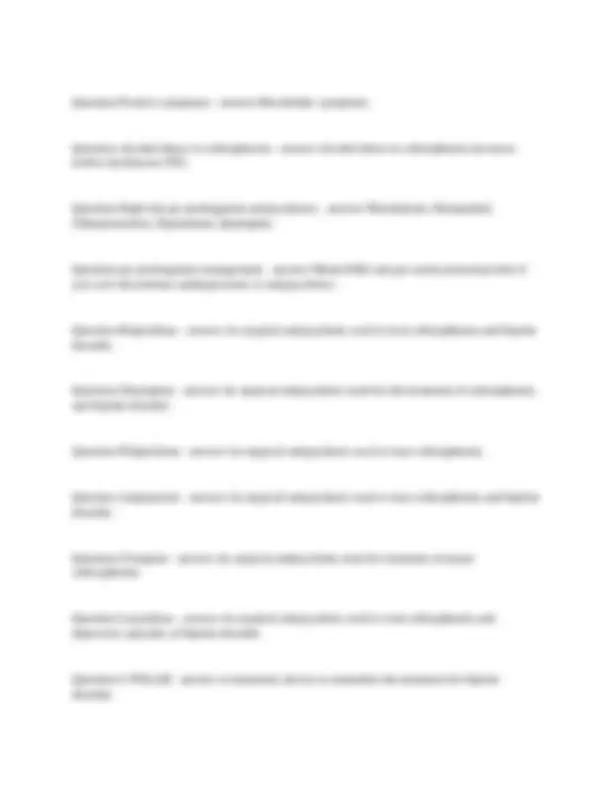
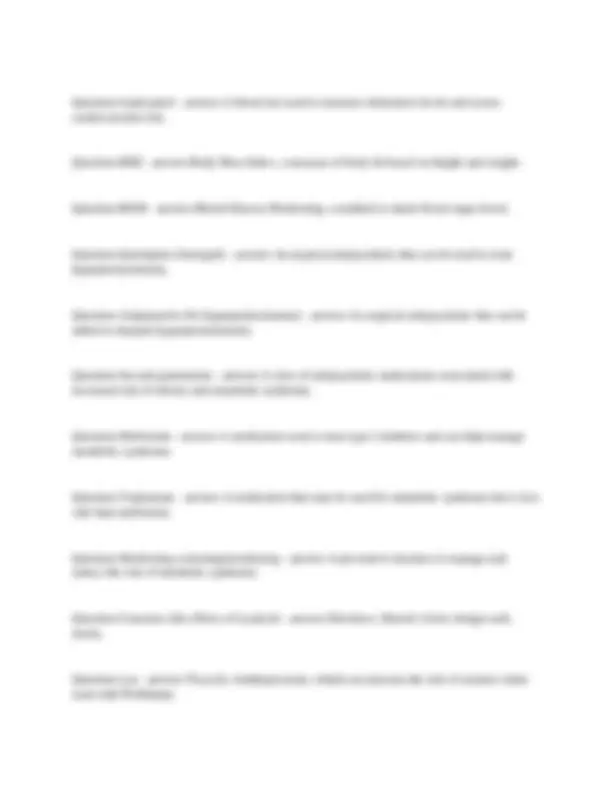
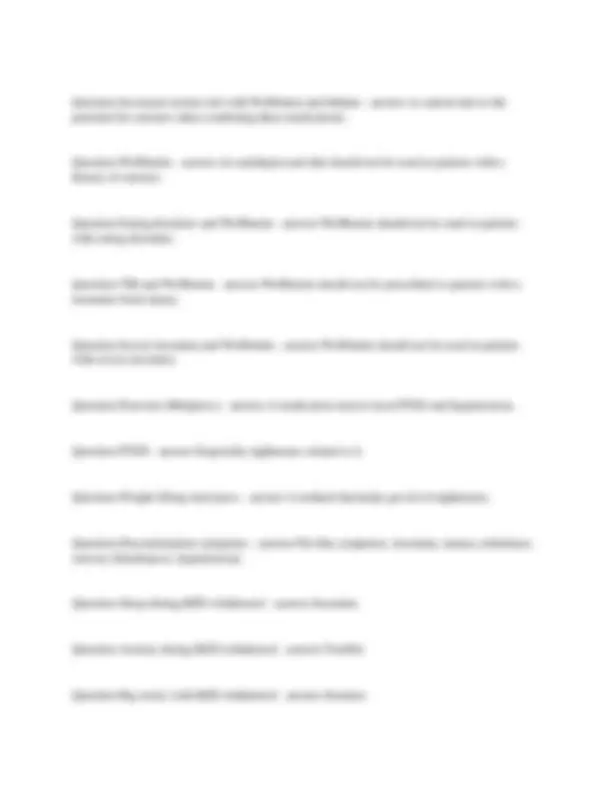
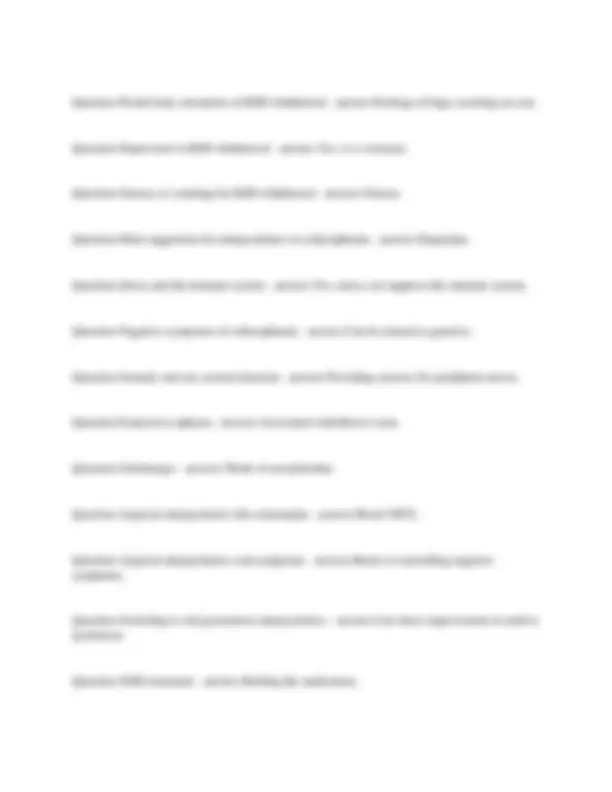
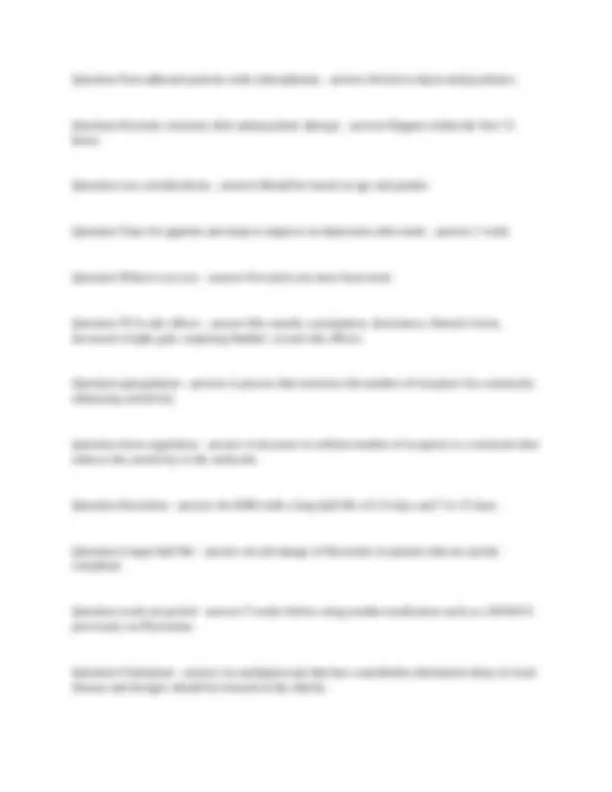
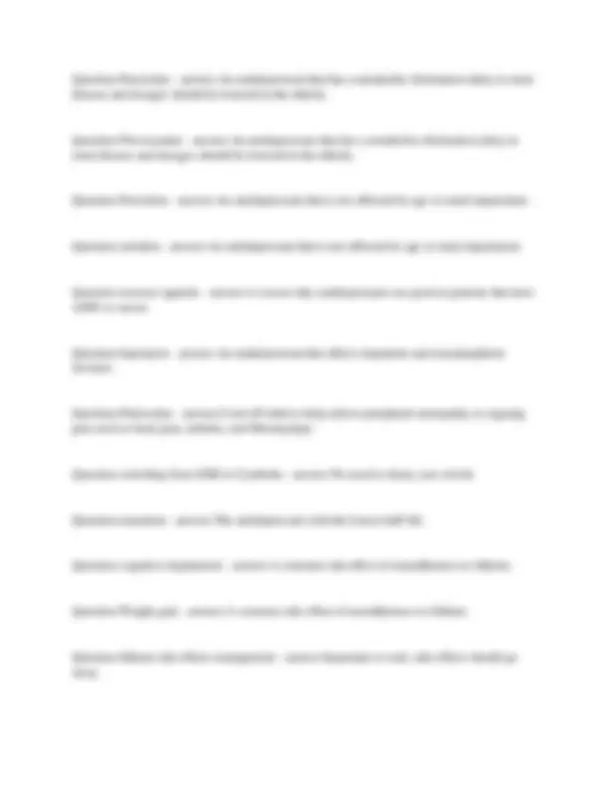
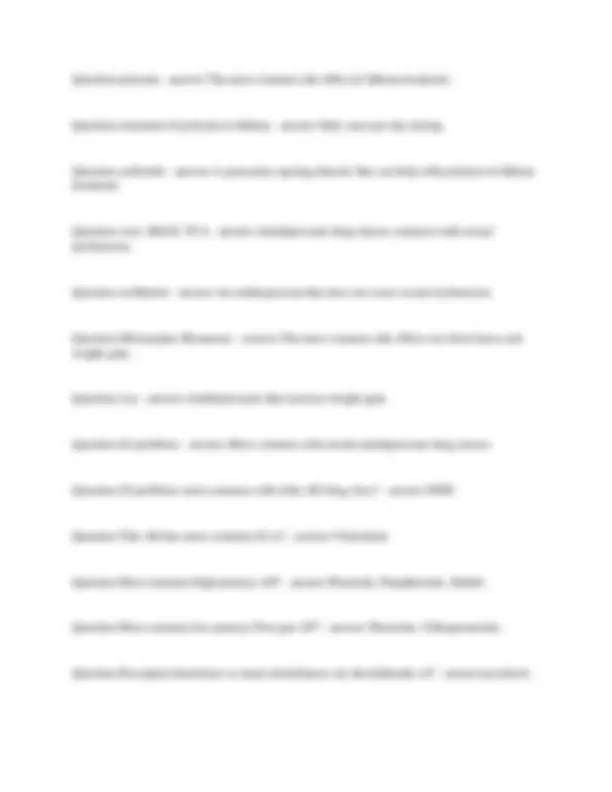
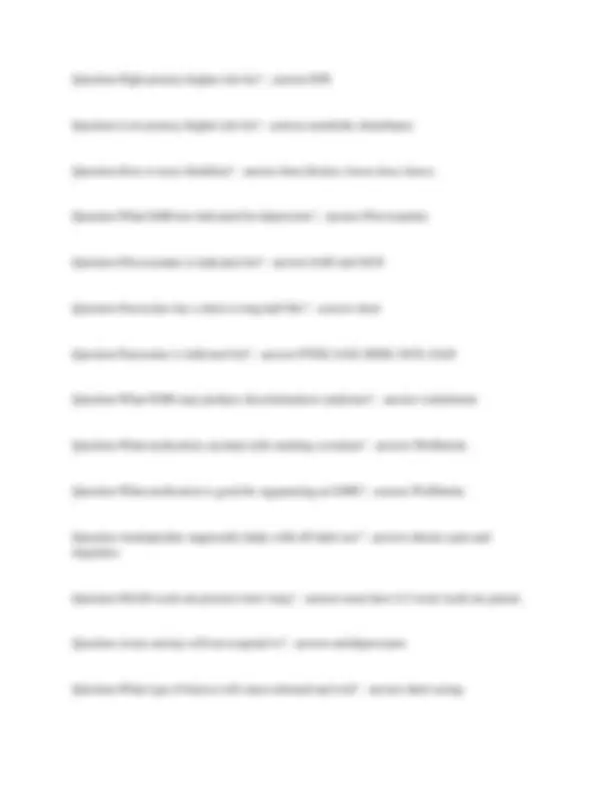
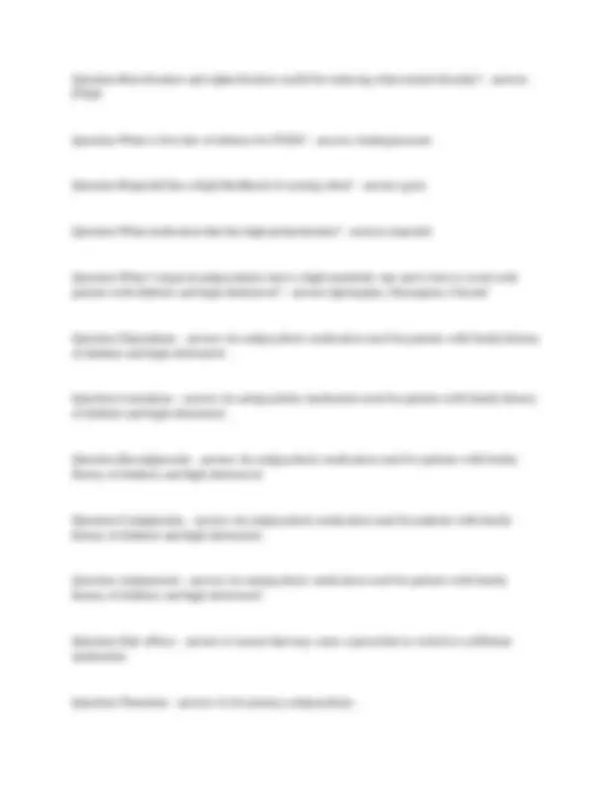
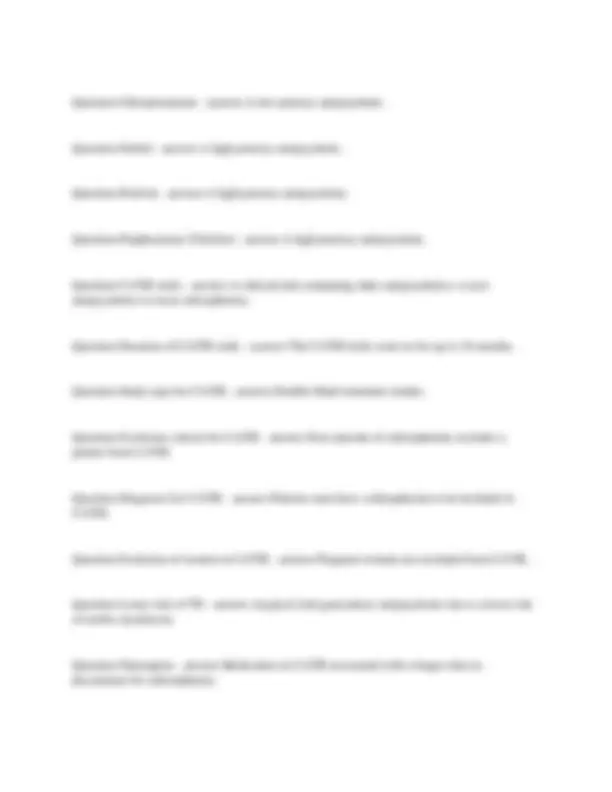
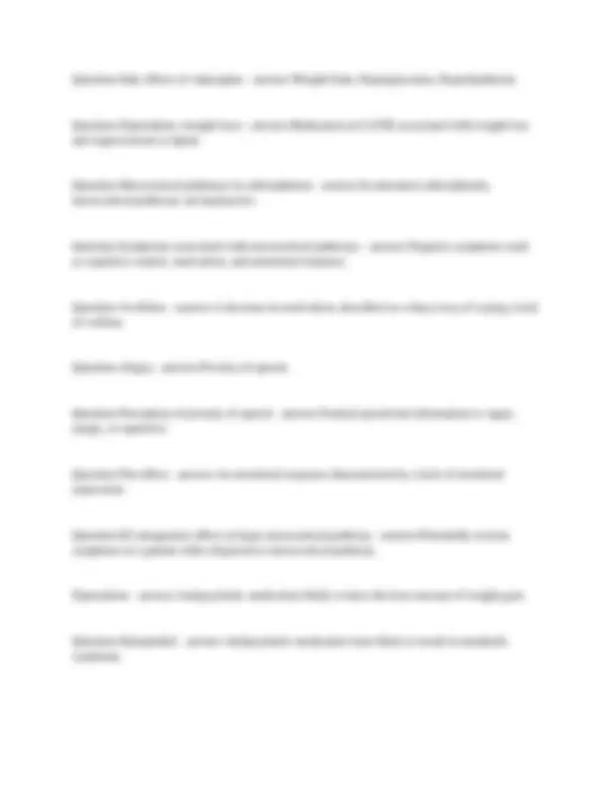
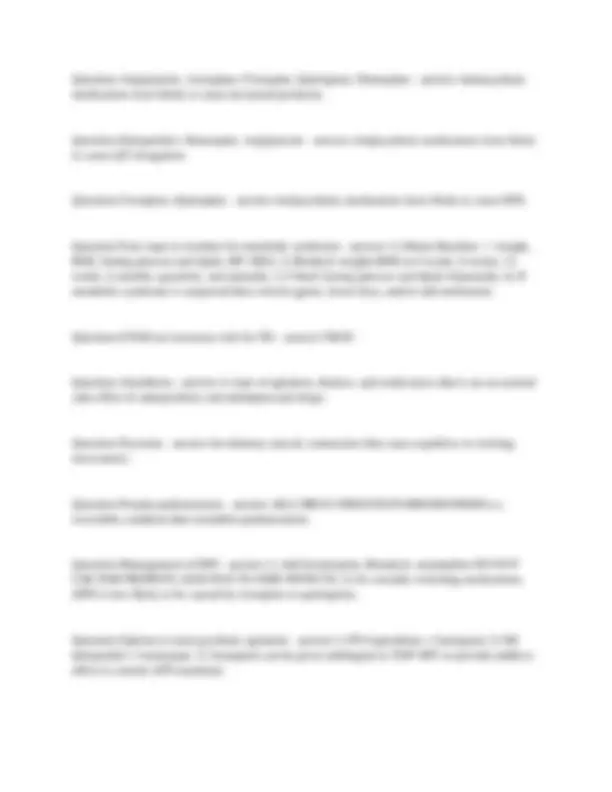
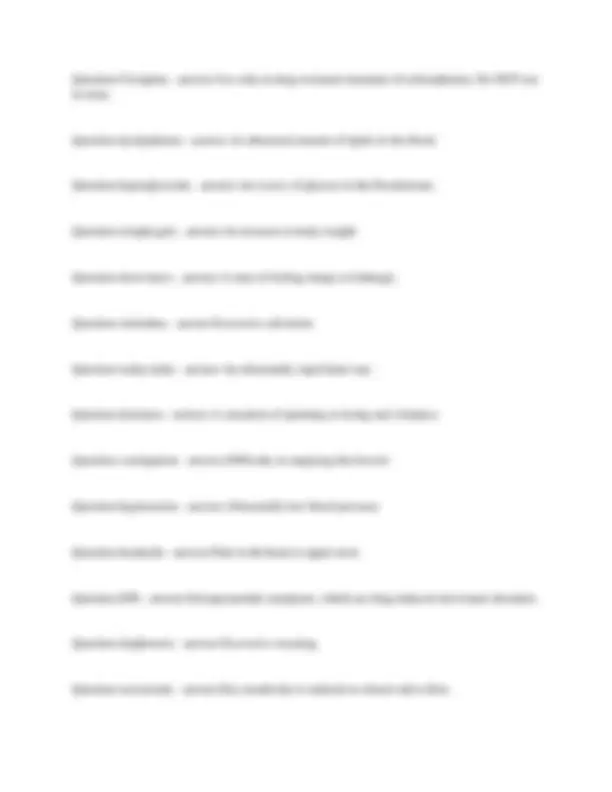
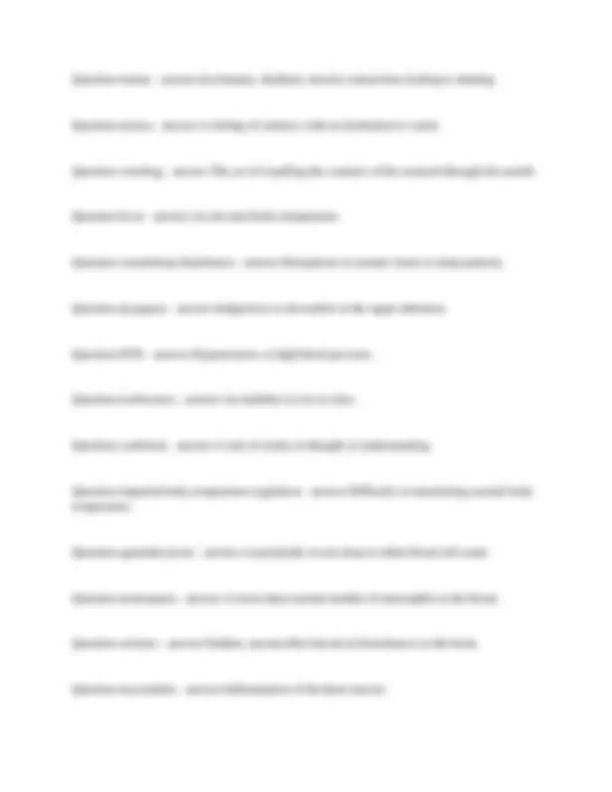
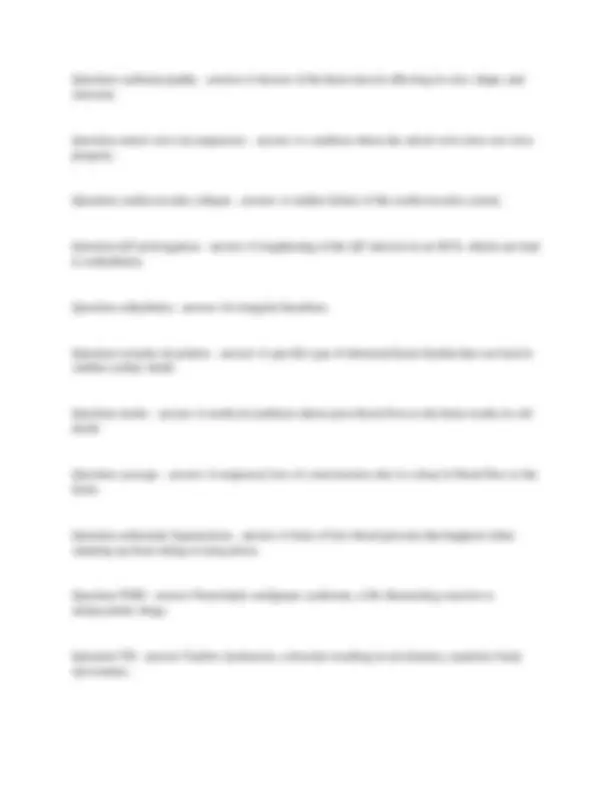
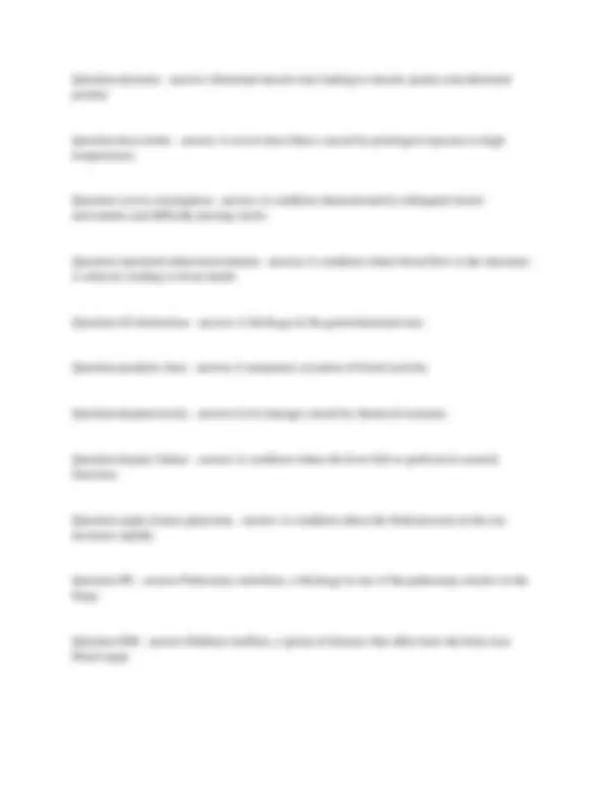
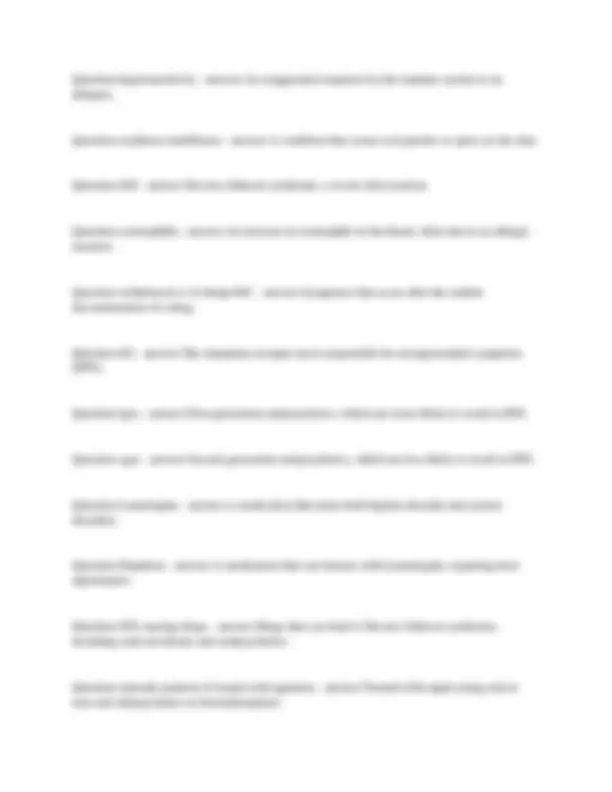
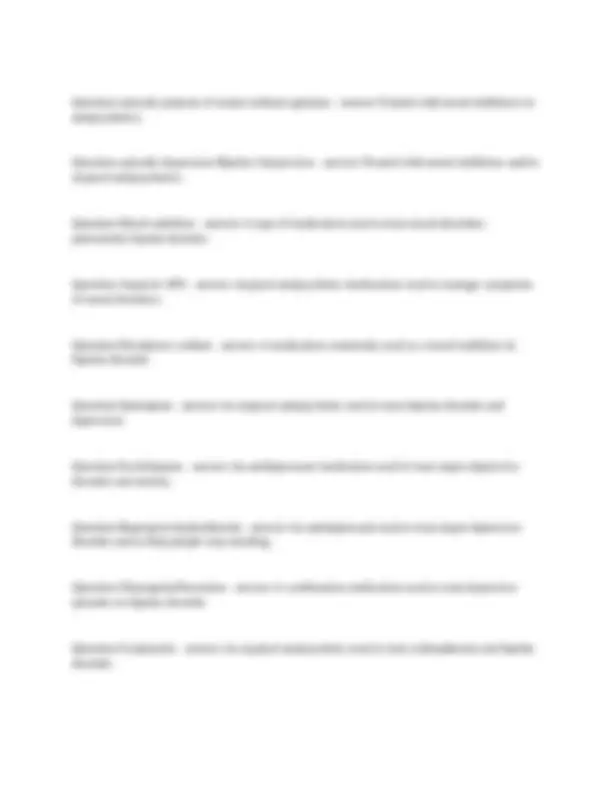
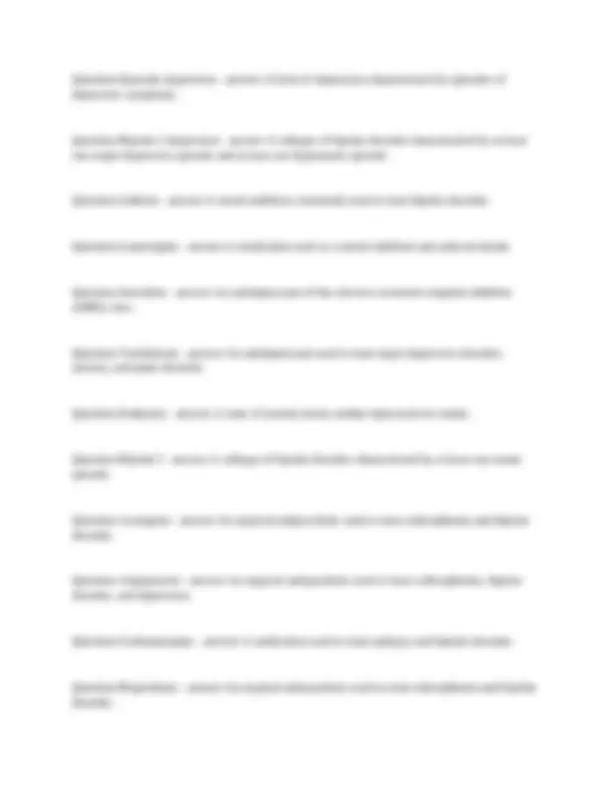
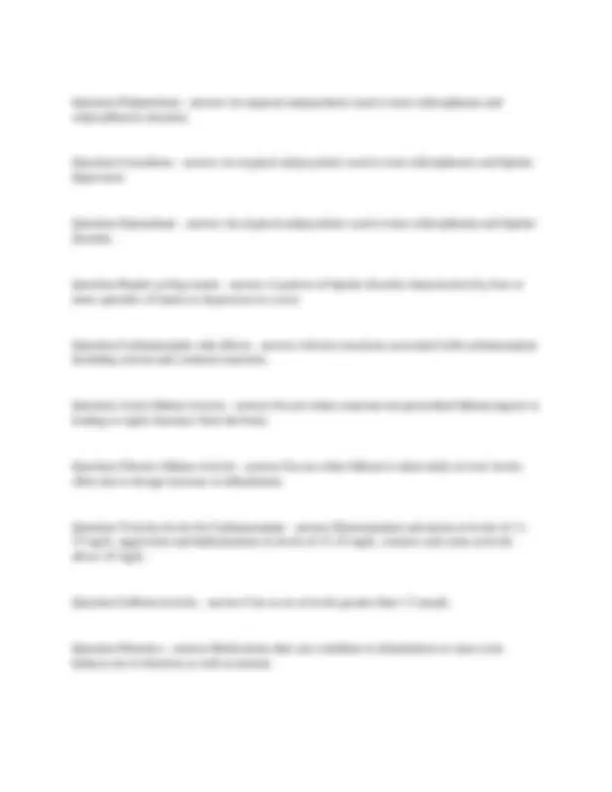
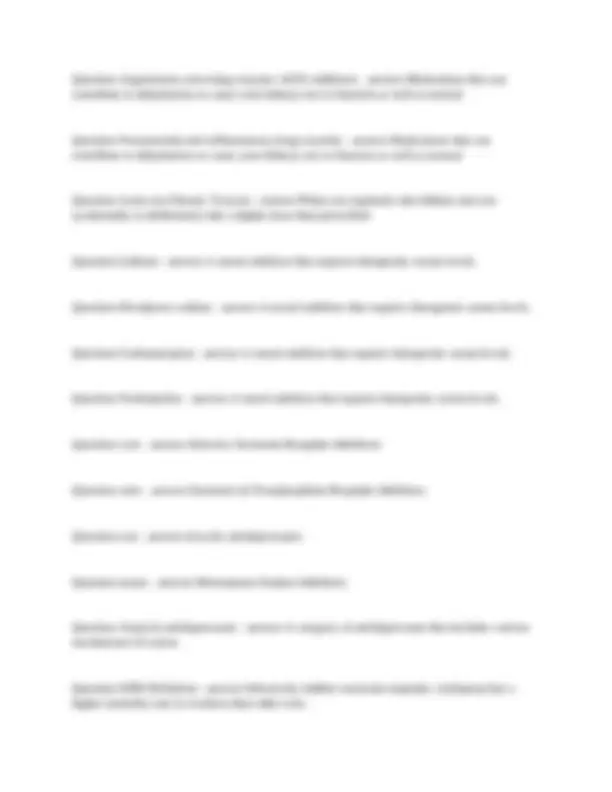
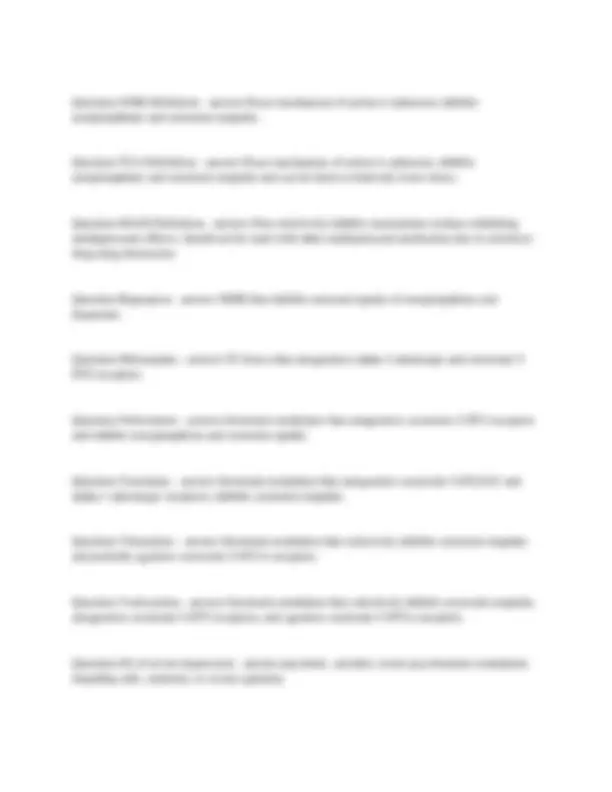
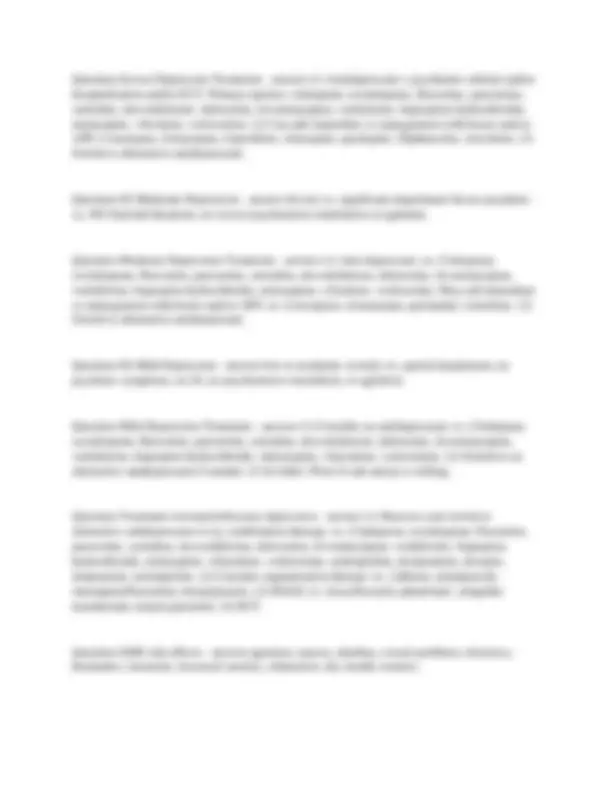
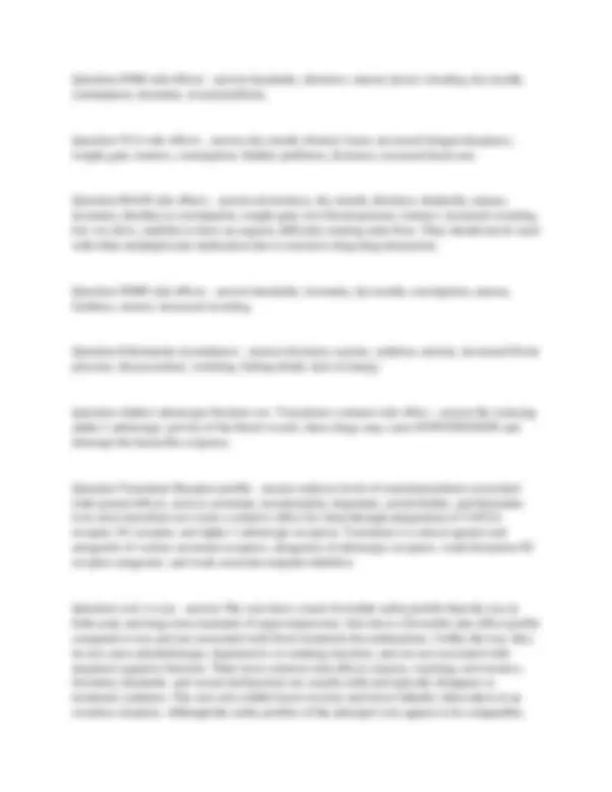
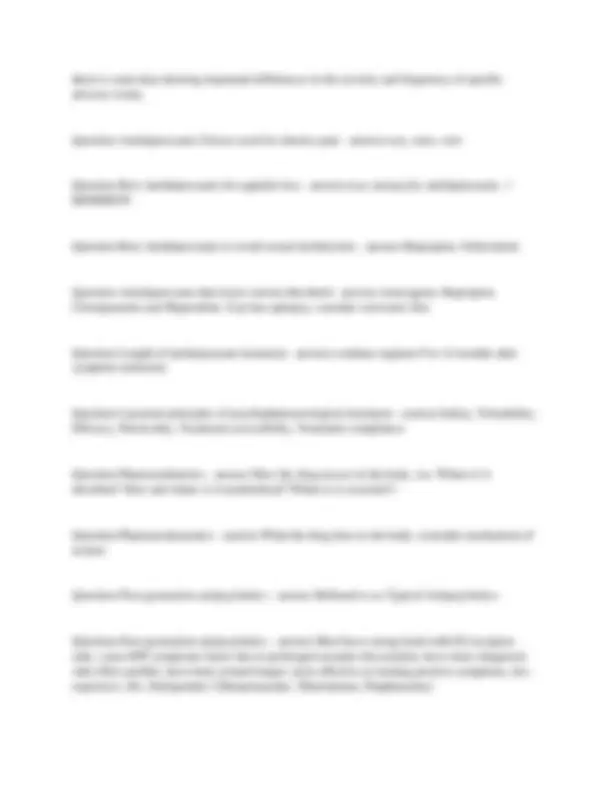
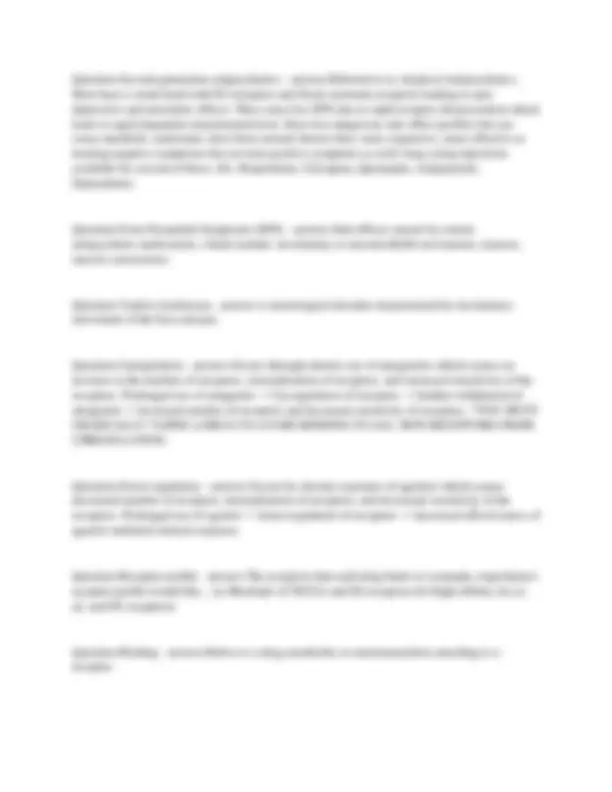
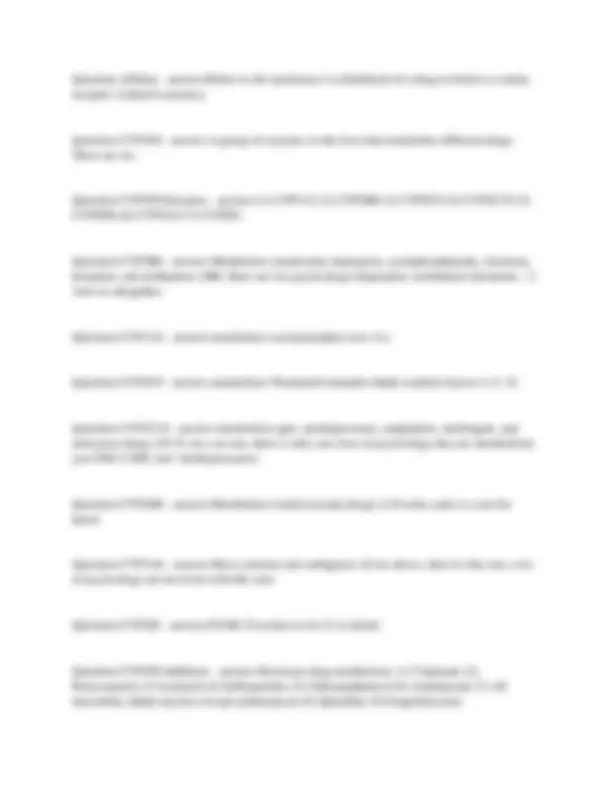
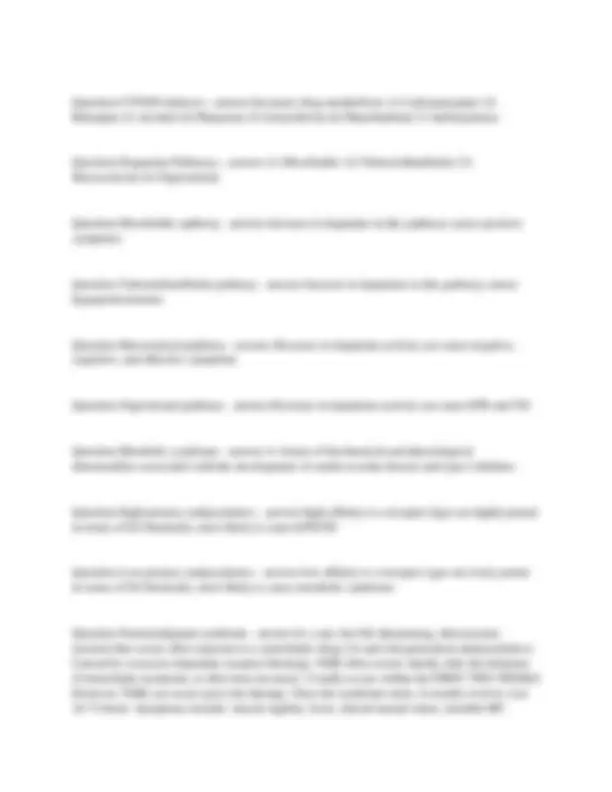
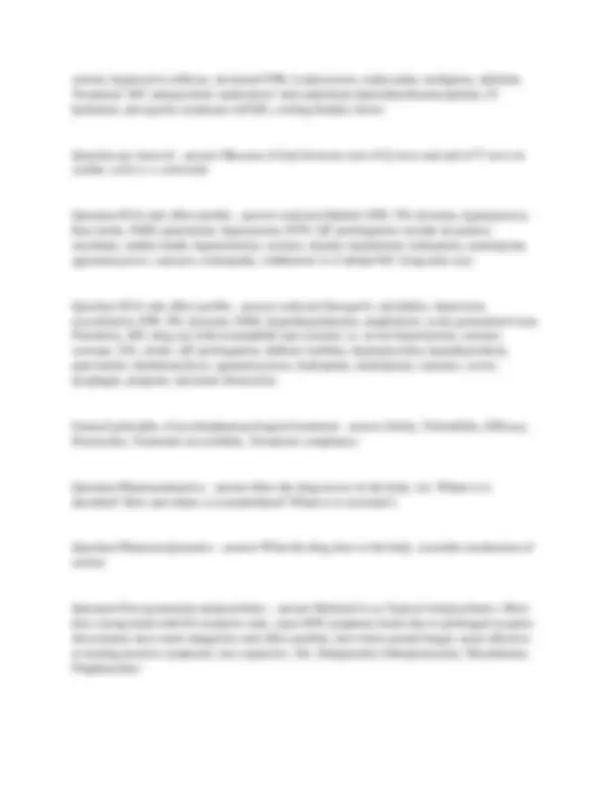
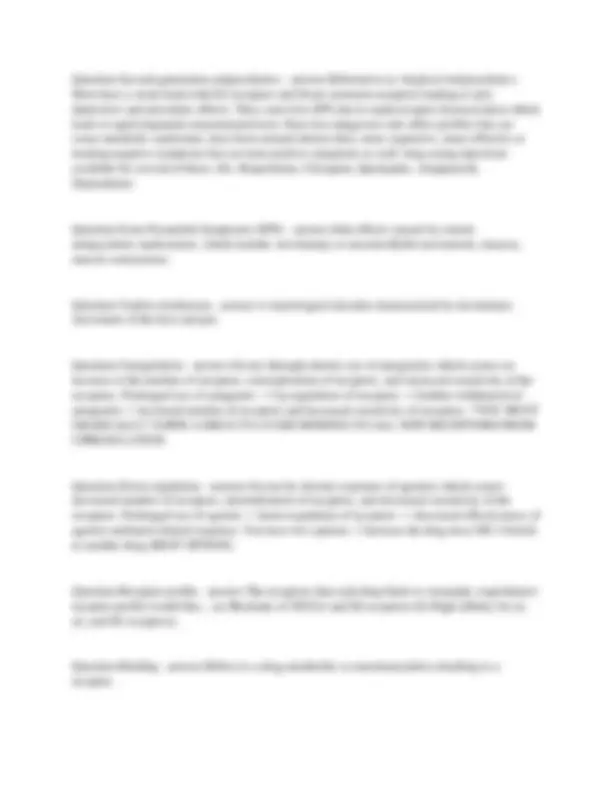
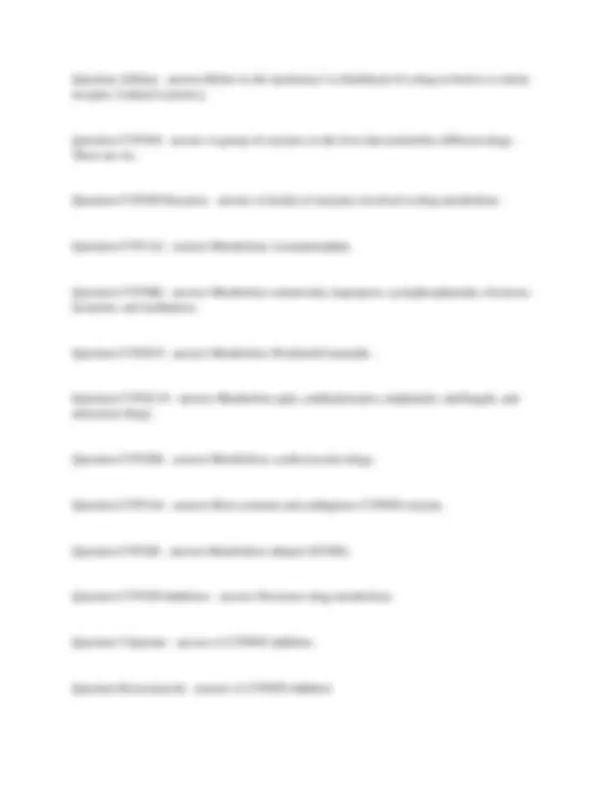
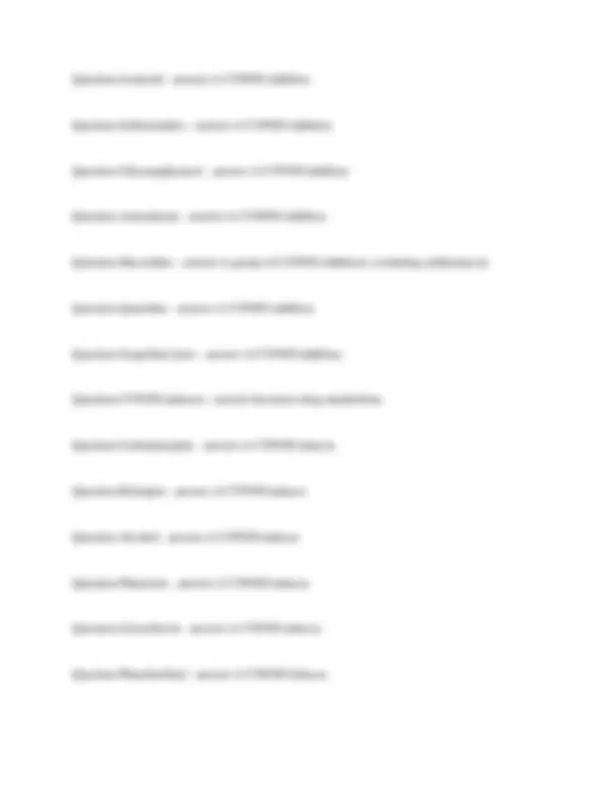
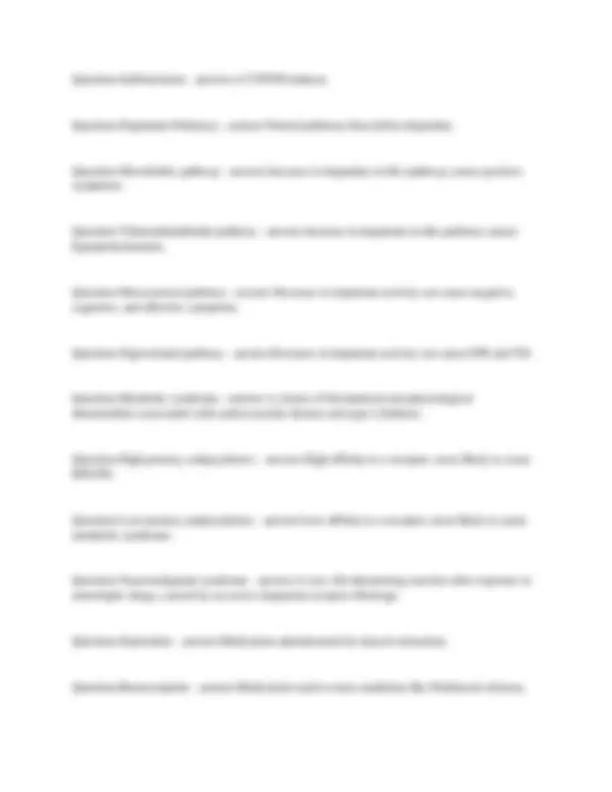
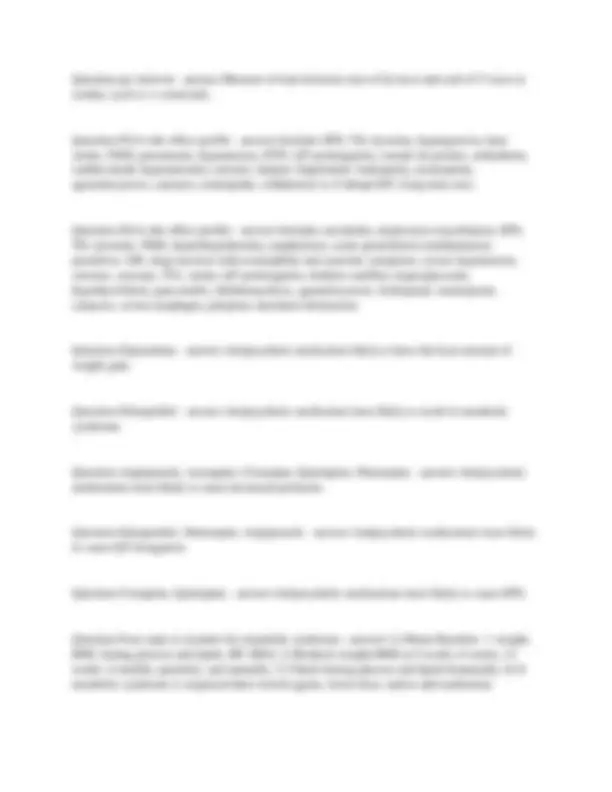
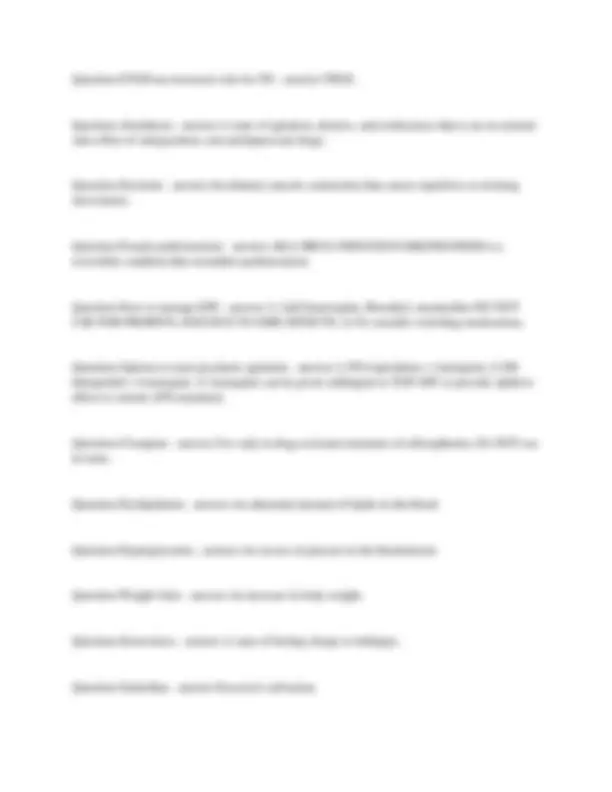
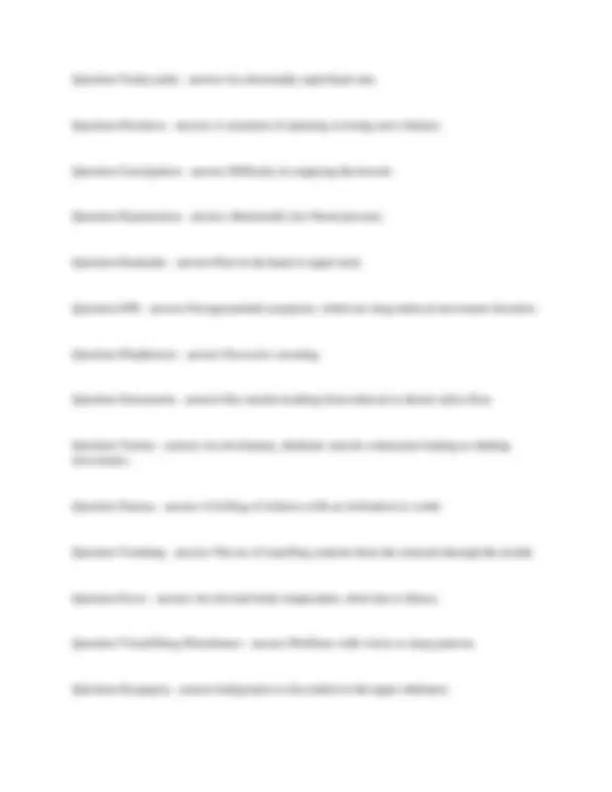
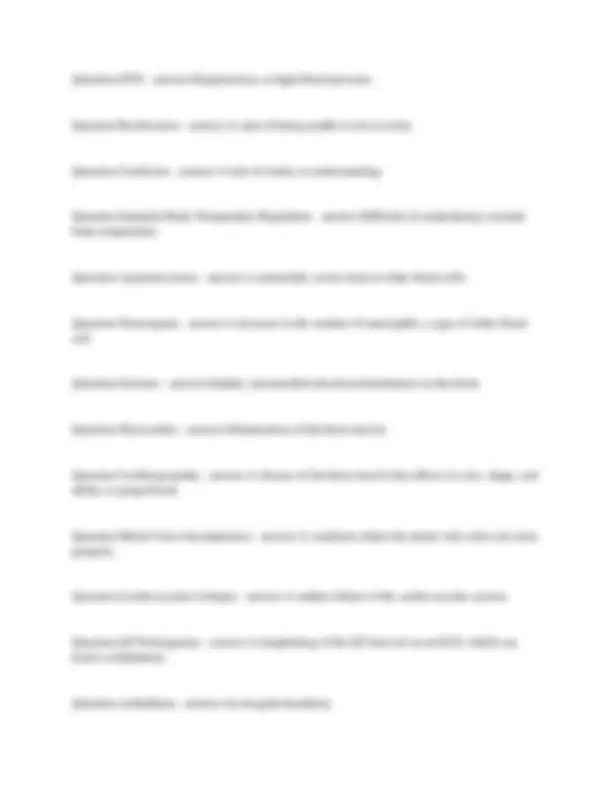
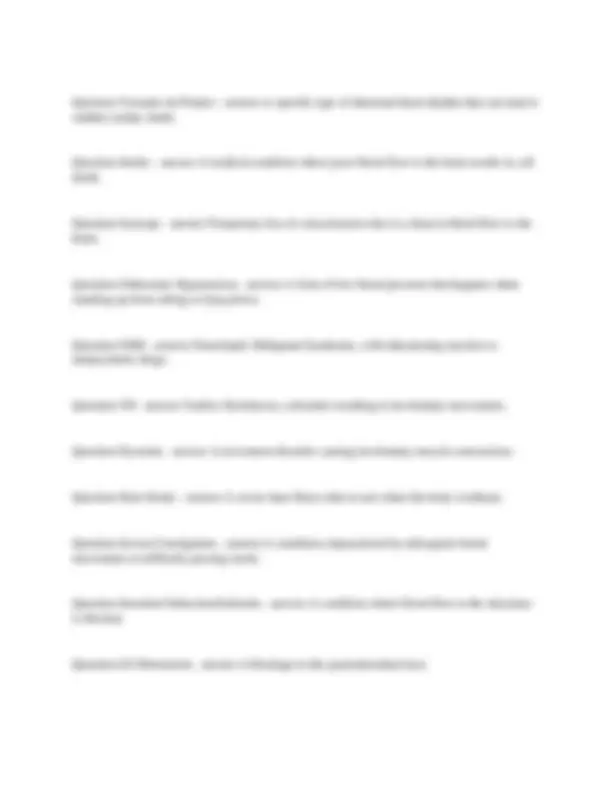
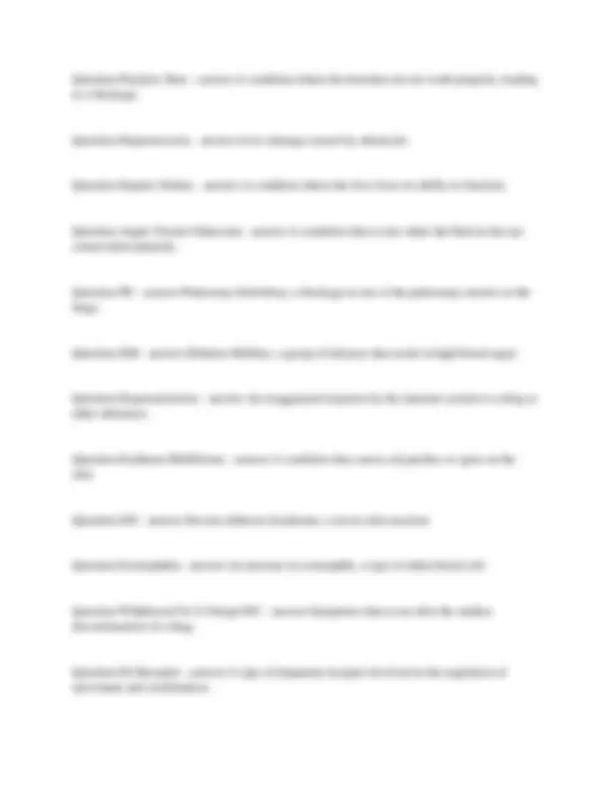
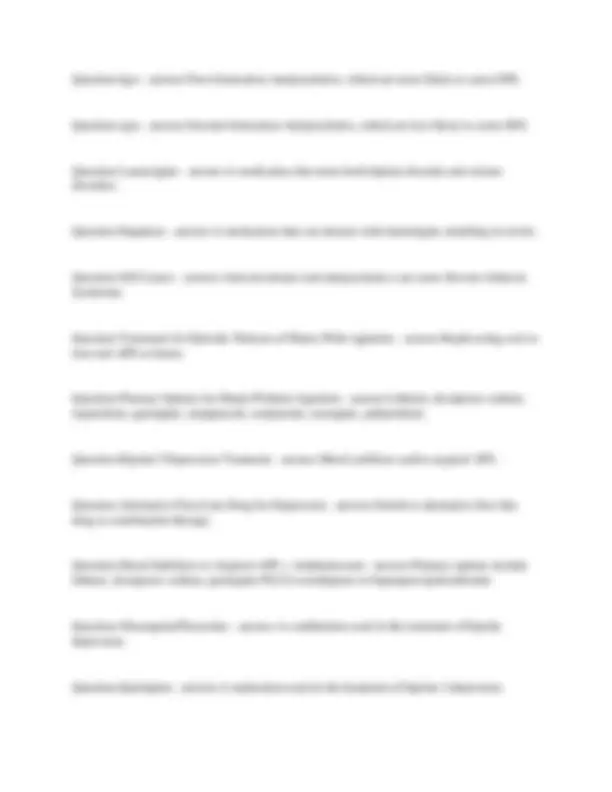
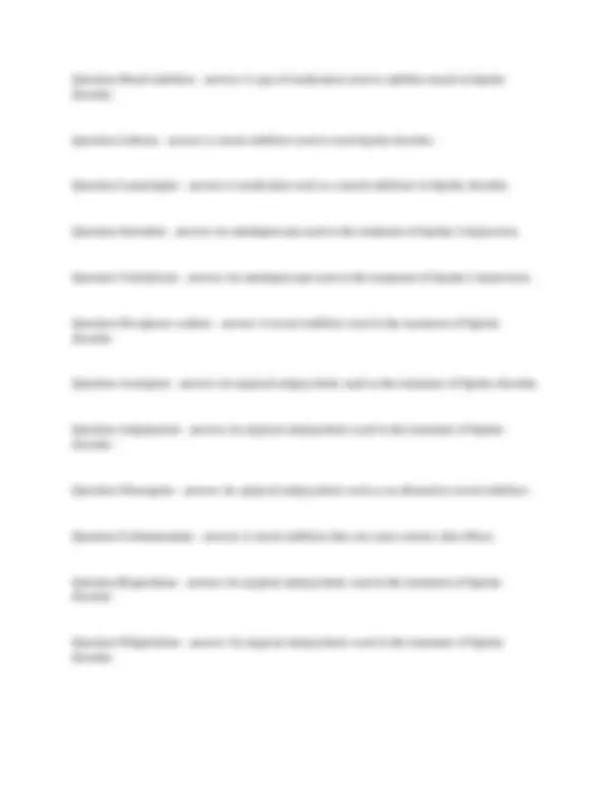
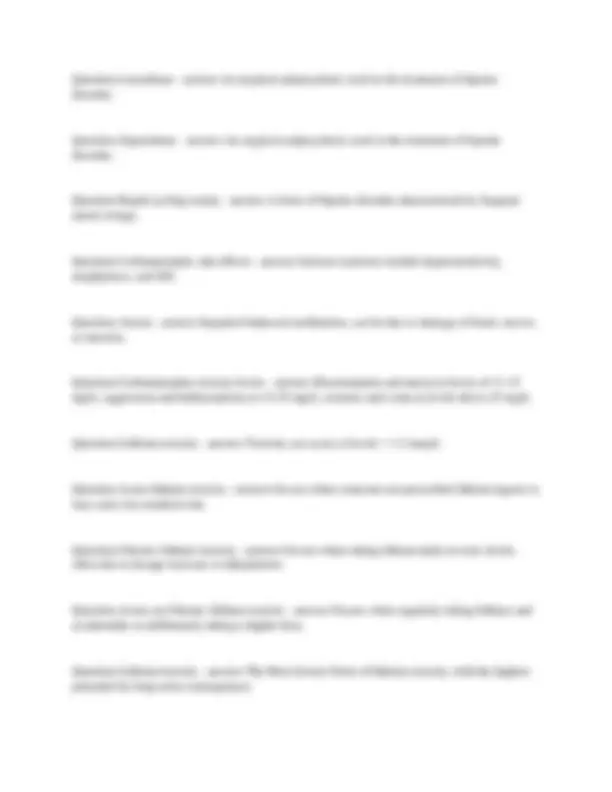
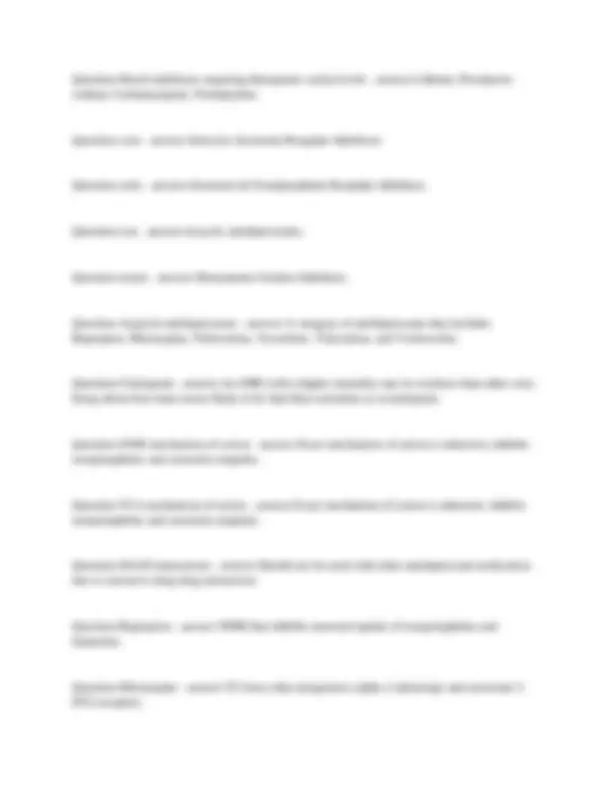
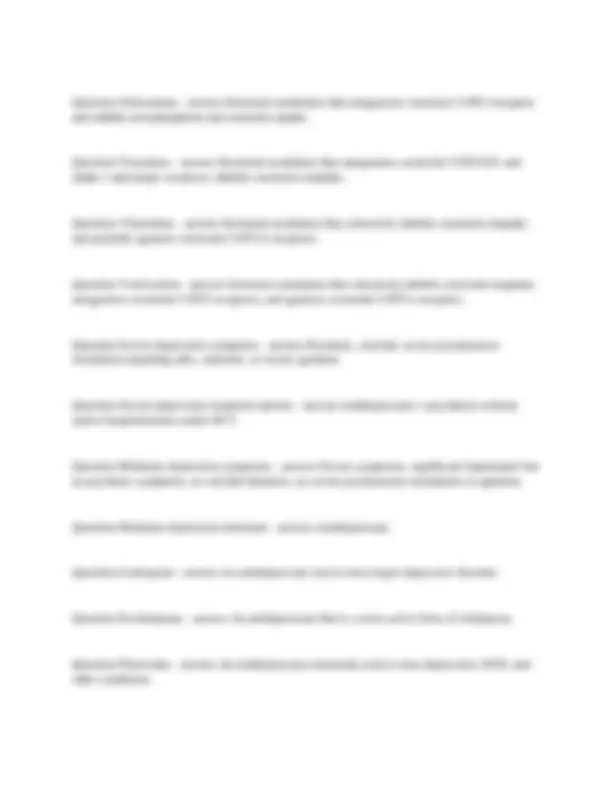
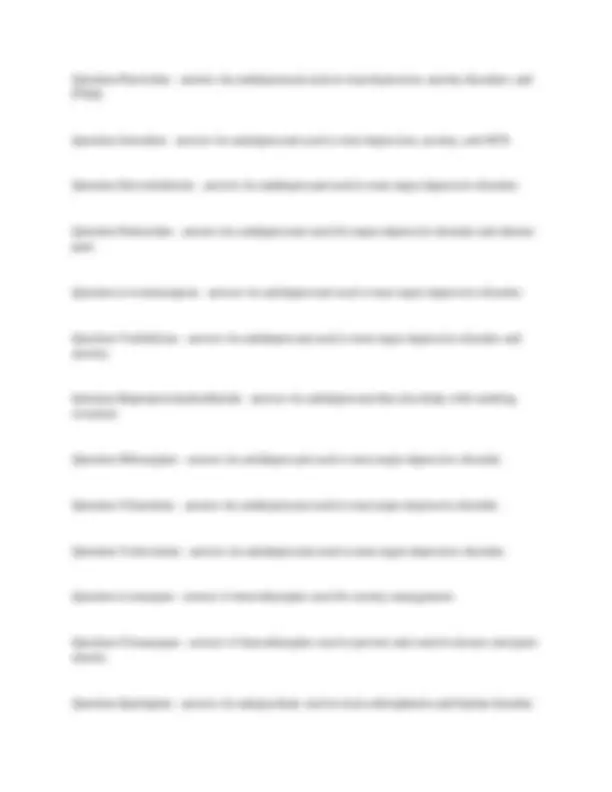
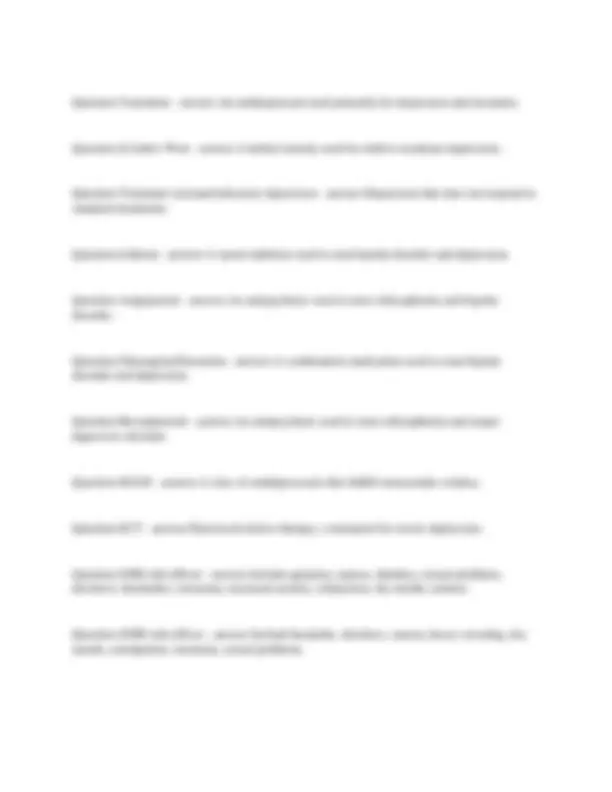
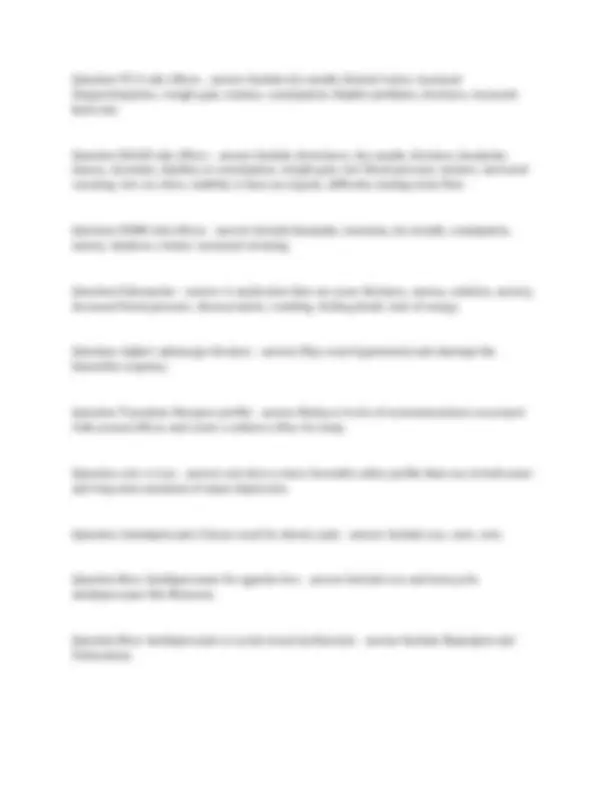



Study with the several resources on Docsity

Earn points by helping other students or get them with a premium plan


Prepare for your exams
Study with the several resources on Docsity

Earn points to download
Earn points by helping other students or get them with a premium plan
Community
Ask the community for help and clear up your study doubts
Discover the best universities in your country according to Docsity users
Free resources
Download our free guides on studying techniques, anxiety management strategies, and thesis advice from Docsity tutors
NSG 552 LATEST EXAM 2 PSYCHOPHARMACOLOGY GRADE A QUESTIONS AND DETAILED SOLUTIONS.pdf
Typology: Exams
1 / 82

This page cannot be seen from the preview
Don't miss anything!











































































Question-buprenorphine - answer-Taking this medication too soon after last opioid use increases the chances of intense withdrawal that comes on very quickly (precipitated withdrawal). Question-opioid intoxication - answer-Symptoms include nausea and vomiting, respiratory depression, constipation, itching, mioisis (small pupil). Patient will experience euphoria and sedation. Question-opioid withdrawal - answer-Symptoms include N/V/D and dehydration, irritability, restlessness, yawning, and twitching, increased HR/BP, chills, increased temperature, rhinorrhea, lacrimation, dilated pupils. Question-naloxone - answer-Treatment for opioid intoxication during which cardiac or respiratory depression is a concern. Question-cocaine intoxication - answer-Symptoms include dilated pupils, HA, tremor, hyper- reflexia, twitching, seizures, or coma, increased HR/BP, arrhythmias, and MI, N/V, incontinence/ARF, or rhabdomyolysis Question-cocaine intoxication - answer-Treatment includes BZD, antipsychotics, and management of medical problems including HTN, stroke, cardiac arrhythmias, hyperthermia, and seizures. Question-cocaine - answer-The use of beta blockers for treatment of chest pain and MI during this intoxication is to be avoided due to unopposed a adrenergic stimulation. Naloxone - answer-MOA: Pure opioid antagonist that competes and displaces opioids at opioid receptor sites.
Question-methadone, buprenorphine, buprenorphine+naloxone - answer-Treatments for opioid use disorder. Question-buprenorphine+naloxone - answer-Treatment for opioid use disorder with comorbid pain. Question-opioids - answer-Inappropriate use of what substance may be due to uncontrolled pain? Question-tablet, injectable, implant - answer-Naltrexone delivery methods. Question-implant - answer-Form of naltrexone limited to inpatient use. Question-buprenorphine - answer-Mu receptor partial agonist for opioid withdrawal. Question-alcohol intoxication - answer-Signs vary with blood levels, from decreased reaction time, muscle incoordination, ataxia, dysarthria, to respiratory failure and coma. Question-severe alcohol intoxication - answer-Treatment includes cardiopulmonary function maintenance, thiamine, and haloperidol PRN agitation. Question-thiamine - answer-Given IM/IV for 3 days to prevent Wernicke's encephalopathy, along with IV fluids and a banana bag. Question-benzodiazepines - answer-Class of drugs to avoid for acute alcohol intoxication. Question-uncomplicated alcohol withdrawal - answer-Treatment includes BZD in either symptom triggered or fixed dose; diazepam and chlordiazepoxide have a longer half life, and oxazepam and lorazepam are suitable for patients with hepatic dysfunction. Question-diazepam and chlordiazepoxide - answer-bzds with a long half-life used to treat AUD.
Question-atypical antipsychotics - answer-Treatment for agitation in patients with dementia. Question-BZD - answer-Used only for short term and acute episodes of aggression, agitation, and psychosis in patients with dementia. Question-delirium - answer-tcas, Anticholinergics, Benzos, Non-benzos, Corticosteroids, H blockers, opioids cause what medical emergency in elderly patients? Question-hypersexuality, hyperorality - answer-Klüver-Bucy syndrome, a type of frontotemporal degeneration (FTD), results from bilateral lesions of the medial temporal lobe and manifests with what 2 common symptoms? Question-Donepezil, rivastigmine, galantamine - answer-Cholinesterase inhibitors appropriate for mild to moderate dementia, remember Damn, Grandma's Regressing Question-memantine - answer-NMDA receptor antagonist that promotes synaptic plasticity and is used for moderate to severe dementia. Question-nortiptyline - answer-TCA with fewest anticholinergic effects, making it the most appropriate TCA in the elderly ssris ARE PREFERRED Question-mirtazapine - answer-Most appropriate medication for elderly patient with MDD, insomnia, and decreased appetite. Question-methylphenidate - answer-In cases of severe depression or psychomotor retardation, this may be used in low doses as an adjunct to antidepressants. Question-trazodone - answer-Best alternative to sedative-hypnotic use for insomnia in the elderly as it's less likely to cause memory impairment, paradoxical excitement, or rebound insomnia.
Question-delirium - answer-A reversible condition that may be caused by drugs, electrolyte imbalance, low O2 sat, infection, reduced sensory input, intracranial events, urinary retention, or myocardial issues. Question-methylphenidate, amphetamine salts, dexmethylphenidate, dextroamphetamine - answer-The 4 stimulants for treating ADHD. Man, Adhd Does Damage know long vs short acting Question-tcas, clonidine, guanfacine, bupropion, atomoxetine - answer-The 5 non-stimulants for treating ADHD. Calm Teens Give Better Answers Question-height, weight, BP, HR, EKG - answer-What baseline measurements are needed prior to starting treatment for ADHD? Question-atomoxetine - answer-Second line treatment, non-stimulant, used in patients with history of SUD or when family prefers non-stimulant. Question-intermediate or long acting - answer-Types of stimulants used when patient needs duration of action longer than 4 hours; also improves adherence and is less likely to be abused. Question-dizziness, poor growth, decreased appetite, insomnia, mood lability - answer-Common adverse effects of stimulants Dizzy Patients Demand Immediate Monitoring Question-dizziness - answer-Children exhibiting this symptom require BP and HR monitoring. If it occurs at peak, patient should be switched to a longer acting formula. Question-insomnia - answer-Patients exhibiting this stimulant associated symptom should be switched to a shorter acting formula. Question-cardiovascular - answer-Prior to starting a stimulant, patient history, family history, and exam should be conducted with what focus?
Question-dose reduction - answer-May be used to reduce sexual side effects caused by psychotropic medications when cost is an issue. Question-hypogonadism - answer-A cause of hypoactive desire in males that indicates a life-long rather than acquired condition. Question-antisocial - answer-Cluster B personality disorder that begins as a conduct disorder in childhood. Question-DBT - answer-Gold-standard treatment for borderline. Question-BZD - answer-Class of medications strongly discouraged in treating BPD, due to risks of worsening impulsivity and suicidality. Question-pharmacological - answer-Treatment modality recommended against when treating the primary traits of antisocial personality disorder. Question-hormone replacement therapy - answer-Treatment for male hypoactive sexual desire disorder and female sexual interest/arousal disorder. Question-guanfacine - answer-Alpha 2 agonist, first line for tic disorder. Question-desmopressin, imipramine - answer-First line treatment options for enuresis. Question-behavioral therapy - answer-Modality for the management of IDD deficits. Question-methylphenidate - answer-Stimulant medication FDA approved for children 6+ that should not be used in patients with PRE-EXISTING CARDIAC CONDITIONS. Question-dextromethylphenidate - answer-FDA stimulant approved for children 3+.
Question-guanfacine - answer-Non-stimulant approved for children 6-17. Low potency antipsychotic medications - answer-Low potency means low affinity to dopamine receptors, meaning increased doses are required. Question-High potency antipsychotic medications - answer-High potency is a greater affinity of dopamine receptors, meaning decreased doses are required. Question-First generation antipsychotics examples - answer-Chlorpromazine (thorazine), Thioridazine (mellaril), Loxapine (loxitane), Thiothixene (Navane), Perphenazine (Trilaforn), Haldol, Fluphenazine, Trifluoperazine. Question-Prolonged QTC - answer-Obtain baseline EKG. Question-Orthostasis - answer-Due to the blockade of α1 receptors. Question-Elevated liver enzymes - answer-A side effect of first generation antipsychotics. Question-EPS - answer-Extrapyramidal Symptoms (akathisia, dystonia, parkinsonism). Question-Gynecomastia - answer-Enlargement of breasts in males, a side effect in men. Question-Tardive Dyskinesia - answer-A mostly irreversible involuntary movements of the facial muscles, tongue, and limbs; a possible neurotoxic side effect of long-term use of antipsychotic drugs that target certain dopamine receptors. Question-Risk factors for Tardive Dyskinesia - answer-High doses, long duration, old age, women, hx of EPS, substance abuse (heavy smoking), diabetes.
Question-Absence of menses in women - answer-A side effect of first generation antipsychotics. Question-Erectile dysfunction in men - answer-A side effect of first generation antipsychotics. Question-Dystonia - answer-A type of EPS associated with antipsychotic medications. Question-Tardive Dyskinesia (TD) - answer-TD symptoms may initially worsen transiently as medication dosages are lowered. Question-Clozapine (Clozaril) - answer-Considered for switching as it has the lowest risk of tardive dyskinesia. Question-Akathisia - answer-A movement disorder characterized by an intense feeling of inner restlessness and the inability to stay still. Question-Treatment for Akathisia - answer-Beta-blocker (propranolol). Question-Pseudo-Parkinsonism - answer-Refers to a group of symptoms resembling those seen in Parkinson's disease but induced by medications, particularly antipsychotic drugs. Question-Symptoms of Pseudo-Parkinsonism - answer-May include tremors, muscle stiffness or rigidity, bradykinesia (slowness of movement), and postural instability. Question-Treatment for Pseudo-Parkinsonism - answer-Benztropine (Cogentin). Question-Neuroleptic Malignant Syndrome (NMS) - answer-A life-threatening idiopathic reaction to antipsychotic medications, more common with fgas, with a 20% mortality rate if untreated. Question-Symptoms of NMS - answer-Fever, autonomic instability (BP, HR), leukocytosis, tremor, elevated CK, rigidity, excessive sweating.
Question-Management of NMS - answer-Includes D/C medication, supportive care (hydration, IV benzos for relaxation, cooling blankets), and administering sodium dantrolene, bromocriptine, amantadine. Question-Co-prescribing drugs to prevent EPS - answer-Do NOT co-prescribe drugs in efforts to prevent EPS due to high anticholinergic side effects. Question-Starting dose for elderly patients - answer-Start at lower doses to help prevent EPS. Question-Sensitivity of elderly patients - answer-Elderly patients are often more sensitive to the side effects of antipsychotic medications, including EPS and anticholinergic effects. Question-Second-Generation Antipsychotics (sgas) - answer-Examples include clozapine, olanzapine, quetiapine. Question-Indication for sgas - answer-First line of treatment for psychiatric disorders such as acute mania, bipolar disorder, and as adjunctive in unipolar depression. Question-Management of symptoms by sgas - answer-They manage positive and negative symptoms of schizophrenia. Question-Percentage of total antipsychotics prescribed - answer-Accounts for 80% of total antipsychotics prescribed. Question-MOA - answer-Blocks both dopamine and serotonin receptors Question-Metabolic syndrome in SGAS - answer-A cluster of conditions that increases the risk of heart disease, stroke and diabetes. Question-Conditions included in metabolic syndrome - answer-Obesity, elevated triglycerides, low HDL levels, BP greater than 135/
Question-Lurasidone metabolic syndrome risk - answer-Low risk for metabolic syndrome Question-Caution with Lurasidone - answer-Use with caution in patients with hepatic impairment Question-Clozapine (Clozaril) use - answer-Used to treat refractory schizophrenia Question-Clozapine and SI risk - answer-Only antipsychotic shown to decrease SI risk Question-Common side effect of Clozapine - answer-Hypersalivation (sialorrhea); occurs in 30- 80%. Question-Clozapine lab monitoring - answer-Monitor WBC and absolute neutrophil count (ANC) Question-Agranulocytosis monitoring for Clozapine - answer-Monitor for agranulocytosis (highest first 3 months of treatment) Question-Clozapine WBC/ANC monitoring frequency - answer-Perform WBC/ANC weekly for first 6 months of treatment and can decrease frequency thereafter Question-Pimavanserin (Nuplazid) use - answer-Used in Parkinson's related psychosis (it's a newer med) Question-Haldol and Prolixin allergic reactions - answer-Allergies in patients sensitive to sesame. Question-Increased risk in elderly with dementia - answer-Antipsychotics can cause an increased risk of death. Question-Allergies in patients sensitive to sesame - answer-Watch for allergic reactions.
Question-Increased risk of death in elderly with dementia related psychosis - answer- Antipsychotics can cause an increased risk of death. Question-Increased risk of falls and nonvertebral fractures - answer-Observed in patients over 65+ years. Question-Major depression disorder s/s (SIG - E - CAPS) - answer-Sleep changes, Interest (loss of), Guilt, Energy, Cognition/concentration, Appetite, Psychomotor, Suicide/death thoughts. Question-Factors that impact antidepressant selection - answer-Previous patient/family member response, impact on comorbidities, clinician familiarity, patient preference, safety in overdose, availability, cost, drug interactions. Question-Top distressing side effects of antidepressants - answer-Sexual dysfunctions, sleep disturbances, and weight gain. Question-Monoamine hypothesis - answer-Depression is associated with low levels of serotonin, dopamine, and norepinephrine in the brain. Question-Delayed onset of therapeutic response to antidepressants - answer-Can take up to 2- 6 weeks. Question-Neurogenic Theory of Depression - answer-Depression causes physical changes/damage to brain tissue, a neurodegenerative process. Question-Genetic vulnerability + stress - answer-Can lead to disorder. Question-Brain derived neurotrophic factor (BDNF) - answer-Can be increased via medication, therapy, or exercise to help repair neurons.
Question-Response rate of antidepressants - answer- 60 - 70% of patients with MDD will respond to antidepressant medications. Question-Trial duration for antidepressants - answer-Most antidepressants require a trial of at least 3-4 weeks for effect and in some cases 6-8 weeks for noticeable effects. Question-Maintenance therapy duration - answer- 6 - 13 months. Question-Withdrawal phenomenon of antidepressants - answer-Most antidepressants have a withdrawal phenomenon; educate patients not to stop abruptly, as this can cause dizziness, headaches, nausea, insomnia, anxiety, electric shocks like 'zaps', malaise, depending on dose and half-life. Question-Mechanism of action for ssris - answer-ssris inhibit presynaptic serotonin reuptake pumps, which increases the availability of 5HT in synaptic clefts. Question-Downstream effects of ssris - answer-Increases brain plasticity; it is the first line of antidepressants. Question-Initial effects of ssris - answer-It may initially worsen anxiety or panic attacks. Question-SSRI drugs - answer-Fluoxetine, fluvoxamine, paroxetine, escitalopram, citalopram, sertraline. Question-ssris black box warning - answer-Increased suicidality in children, adolescents, and young adults. Question-Fluoxetine/Prozac fun facts - answer-Longest half-life (2-3 days, no need to taper), safe in pregnancy, approved for use in children/adolescents, approved for bulimia, can be dosed once a week, can elevate levels of antipsychotics, can cause an activating effect in combination with olanzapine.
Question-Citalopram (Celexa) 20-40mg - answer-Associated with dose-dependent QTC prolongation in doses 40mg+; max dose in geriatrics = 20mg; fewer drug interactions; most lethal in overdose. Question-Sertraline (Zoloft) 50-200mg - answer-Has the most gastrointestinal side effects; give with food; very few drug interactions; activating (agitation, anxiety); favored during pregnancy and nursing. Question-Activating Antidepressants - answer-Good for patients who want to avoid medications that cause tiredness, such as Fluoxetine. Question-ssris advantage over other classes - answer-When choosing an SSRI, consider the inhibition of CYP-450 isoenzymes (induction vs. Inhibition). Question-Most lethal SSRI in overdose - answer-Consider cardiac effects. Question-snris - answer-Serotonin Norepinephrine Reuptake Inhibitors; inhibits dual reuptake of NE and 5HT, leading to increased extracellular concentrations of NE and 5HT. Question-Side Effects of snris - answer-Sustained elevated blood pressure. Question-snris - answer-Venlafaxine (Effexor) 75 - 375mg BID Question-snris - answer-MDD, GAD, neuropathic pain Question-snris - answer-Useful in treating anxiety and panic attacks in depressed patients Question-snris - answer-XR available Question-snris - answer-Highest med with SEXUAL DYSFUNCTION
Question-SRAA - answer-Sedating and promotes appetite (Used with patients who have weight loss and insomnia as primary symptoms of their depression) Question-Tricyclic Antidepressants (tcas) - answer-2nd line of treatment for depression Question-Tricyclic Antidepressants (tcas) - answer-Increases extracellular concentrations of 5HT and NE by inhibiting pre-synaptic reuptake Question-Tricyclic Antidepressants (tcas) - answer-Side effects: anticholinergic effects (dry mouth, blurred vision, constipation, memory problems, urinary retention, narrow angle glaucoma) Question-Tricyclic Antidepressants (tcas) - answer-Lethal in overdose (give 1-week prescription especially in high-risk patients); desipramine is the most lethal Question-Tricyclic Antidepressants (tcas) - answer-Note the 3 c's: Cardiotoxic (arrhythmia), convulsions, coma (caution with cardiac patients) Question-Tertiary Amines tcas - answer-Imipramine (Tofranil) Question-Tertiary Amines tcas - answer-Used for enuresis (incontinence) and panic disorder Question-Tertiary Amines tcas - answer-Clomipramine (Anafranil) Question-Tertiary Amines tcas - answer-Approved for the treatment of OCD Question-Important information for tertiary amine tcas - answer-These are highly anticholinergic/antihistaminergic, antiadrenergic and with greater lethality in overdose Question-Secondary Amines - answer-Nortriptyline, desipramine, amoxapine
Question-Secondary Amines - answer-Less anticholinergic/antihistaminic/antiadrenergic Question-Nortriptyline (Pamelor) - answer-Useful to obtain therapeutic level. Can be safely used in geriatric population Question-Secondary Amines TCAS - answer-Useful in treating chronic pain, useful to obtain therapeutic level, can be safely used in geriatric population. Question-Important information for Secondary Amines TCAS - answer-Less anticholinergic / antihistaminic / antiadrenergic. Question-maois - answer-Monoamine oxidase inhibitors. Question-MAO-A inhibitors - answer-Helpful in treating major depression. Question-MAO-B inhibitors - answer-Used to treat Parkinson's and Alzheimer's. Question-Dietary restrictions for selegiline - answer-NO! Question-MAOI hypertensive crisis - answer-This can occur when an MAOI is taken with tyramine rich foods (red wine, aged cheese, chicken liver, fava beans, cured meats). Question-Symptoms of MAOI hypertensive crisis - answer-Sudden explosive headaches, high BP, facial flushing, palpitation, diaphoresis, fever, n/v, photophobia, autonomic instability, chest pain, arrhythmia and death. Question-Avoid with maois - answer-tcas, atypical antipsychotics, St John's wort, asthma meds, ssris, decongestants, opiates (fentanyl, tramadol, meperidine).